






The Declaration of Strength and Unity conveys the uniting values of the Friendship Movement while affirming that these shared values unite Friendship Centres in the achievement of our shared visions and missions The Membership of the National Association of Friendship Centres (NAFC) hereby makes the following declaration:
We are strong and united as a Friendship Centre Movement (FCM) across Canada. While our visions and missions are unique and diverse, we share in our common vision and purpose of improving the quality of life for First Nations, Inuit and Métis people living in small, medium, large, rural, isolated, remote, and northern urban communities
We provide innovative solutions and responses to the unique needs of Indigenous peoples, from coast to coast to coast, who live in small, medium, large, rural, isolated, remote, and northern urban communities
We are community led and driven We are a cooperative movement, driven by solidarity, communication, mutual respect, knowledge exchange and reciprocity
We are committed to ensuring full and meaningful participation of Indigenous people in all their diversity We particularly seek to include and amplify the diverse perspectives and voices of Youth, Elders, Women, Men, 2SLGBTQQIA+, people with disabilities and neurodivergent people, in all planning and decision-making processes within the Friendship Centre Movement
We reaffirm and promote an equitable society to develop opportunity and respect for all people and living things, and the place of honour that they hold within our communities and the Friendship Centre Movement.
We lead and govern our movement through democratic principles and seek to achieve consensus while respecting the diversity of Indigenous governance and decision-making systems. We support the leadership of the NAFC in advancing the interests of the Friendship Centre Movement across Canada.
We foster an environment that allows for accountability and for all Friendship Centres to enjoy unrestricted participation in the development of the Movement’s priorities and initiatives
We promote the survival and growth of all Indigenous cultures, languages, and identities, both traditional and contemporary.
We provide space for the expression and practice of Indigenous cultures, languages, and identities and encourage the transmission of knowledge and teachings between elders, adults, youth, and children
We create the conditions for Indigenous youth to achieve what they may envision for themselves. We support youth leadership and youth to have a voice in all aspects of the Friendship Centre Movement
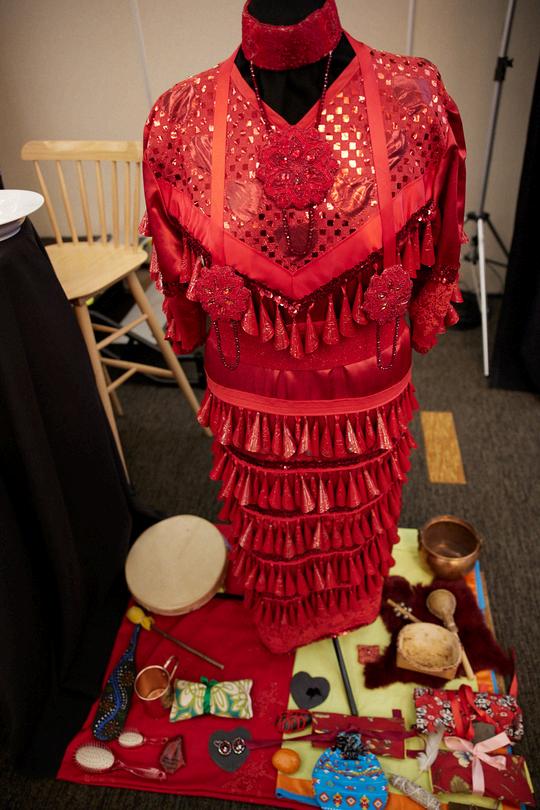
In 2019-2020, the NAFC Board of Directors led the development of a ten-year strategic plan as a major component of developing a new vision that advances the vital work of the FCM
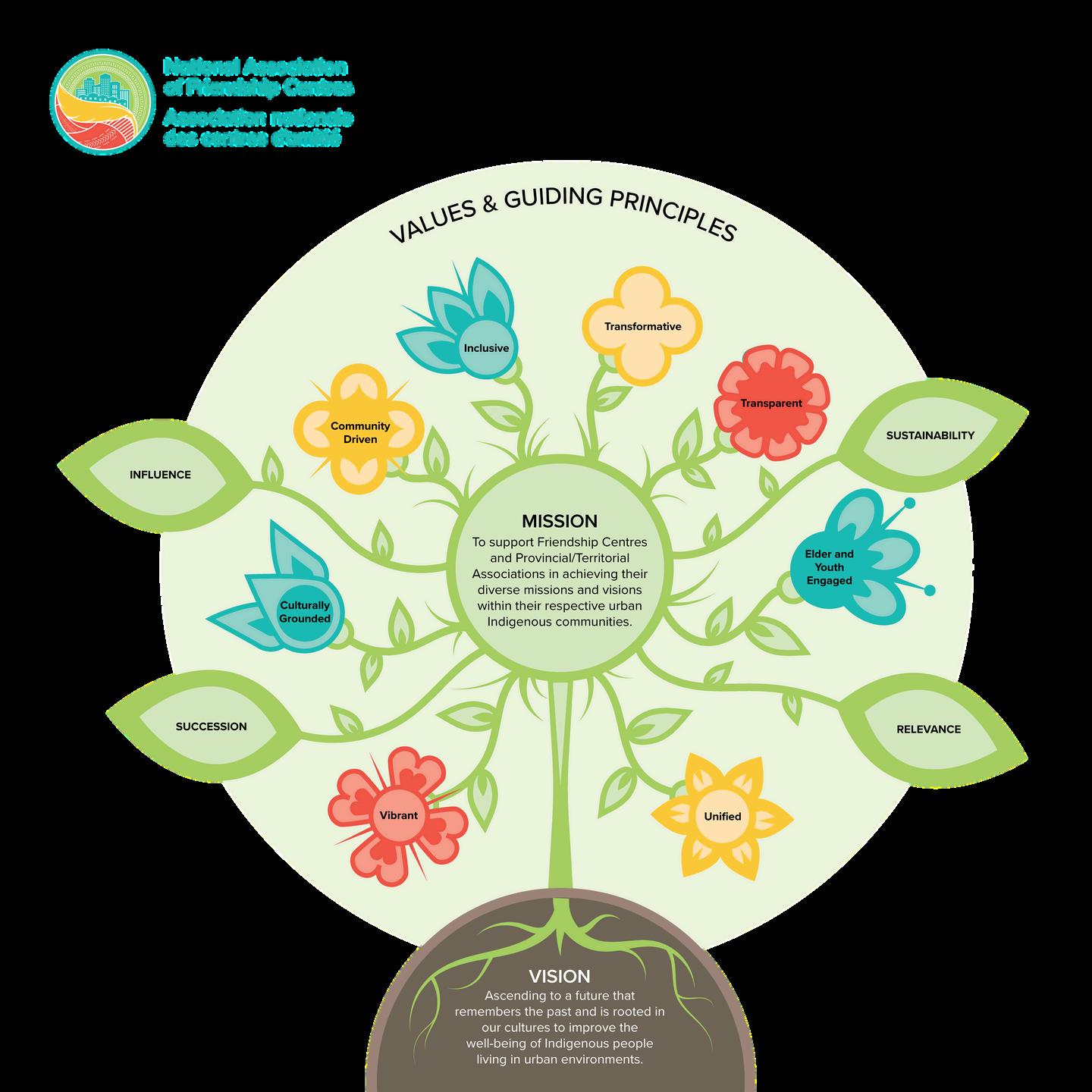
This plan affirms the NAFC’s goals for the next decade The world can often be difficult and barrier-filled for Indigenous people living in urban and rural settings and the work of Friendship Centres has never been more necessary With a renewed focus on our membership and the vitality and success of the FCM, the NAFC sees itself as the FCM’s fierce advocate, strong national partner, and a great amplifier of the work of the FCM.
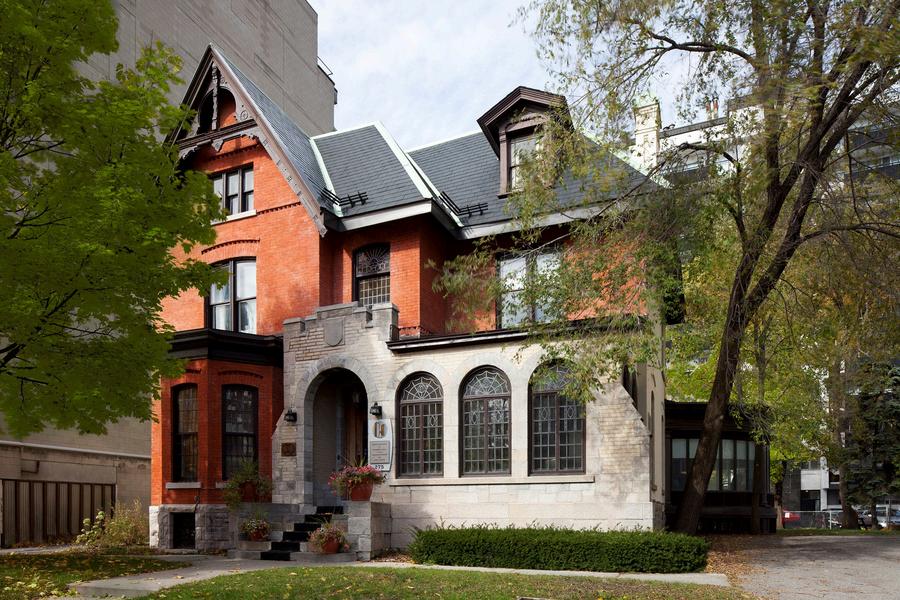
National Association of Friendship Centres (NAFC) was blished in 1972 to represent, nationally, the growing mber of Friendship Centres emerging across Canada. The FC represents over 100 Friendship Centres and vincial/Territorial Associations (PTAs) from coast-to-coastto-coast which make up the Friendship Centre Movement (FCM)
As the national body of the FCM, the NAFC is democratically governed, status inclusive, and accountable to its membership
The NAFC seeks to be: a central, unifying body for the FCM to promote and advocate the concerns of our Member Friendship Centres and PTAs to provide important urban Indigenous perspectives to, municipal, provincial and federal governments, and non-Indigenous civil society organizations
Our Mission
To support Friendship Centres and PTAs in achieving their diverse missions and visions within their urban Indigenous communities
Our Vision
Ascending to a future that remembers the past and is rooted in our cultures to improve the well-being of Indigenous people living in urban environments
The Urban Indigenous Population
The urban Indigenous population isyoung and rapidly growing According to the Canadian Census of Population (2021), approximately 79 1% of the Indigenouspopulation across Canada live in urbansettings Urban Indigenous people are First Nations, Inuit and Métis living in small, medium, and large communities, including rural, isolated, and remote communities, which are off-reserve; outside of their home community, community of origin or settlement; or outside of Inuit Nunangat (Inuit Homelands).
Who are Friendship Centres?
The National Association of Friendship Centres (NAFC) seeks continued support and investment in Friendship Centres (FCs), institutions that serve as lifelines for urban Indigenous communities across Canada. Friendship Centres provide essential services to Indigenous peoples in urban, rural, and remote areas Our Centres are dedicated to delivering holistic programs and support for community members, addressing needs across the entire lifespan, from infancy through to the end of life Core funding has steadily decreased for the last 20 years, yet the urban Indigenous population continues to grow For every $1 received, FCs bring in $9
What Services do Friendship Centres Offer?
Culture: Language, Ceremony, Cultural Activities, Arts & Crafts
Shelter: Childcare, Anti-Violence, Youth, Homelessness
Health: Mental Health, Navigation, Disability, Illness, Sport & Recreation
Support: Food Security, Transportation, Justice, Finances
Development: Education, Employment, Life Skills, Training
Issue: Federal Friendship Centre funding (via Urban Programming for Indigenous Peoples) sunsets in 2025
Impact: Over 1 million people that rely on FC programming are at risk of disruption to crucial culturally relevant services. Thousands of Indigenous jobs are at risk of disappearing.
Challenge: Lack of stabilization of FC funding; lack of federal recognition of urban Indigenous responsibility resulting in jurisdictional wrangling between levels of government; and federal austerity measures.
Ask:
1. Stabilized Core Funding:
Current NAFC funding expires in 2025, has not kept up with the rate of inflation or actual cost of services since 2005, does not account for the growing population served, and the ongoing needs of Friendship Centres
2. Emergency Response Funding & Climate Change Mitigation:
The NAFC urges the development of apermanent funding mechanism to all Friendship Centres to respond to the ever in increasing needs arising from climate related natural disasters.
3. Devolution and Transfer of Services to Indigenous Entities:
The devolution/transfer of services to the NAFC will empower Indigenous communities to determine their own futures, supports and institutions, moving us away from a colonial relationship informed by oversight, overreach, and instability
Cost: Starting at $62 2 million in year 1 with annual inflation escalator Approximately $684,000,000 over 10 years
Results: In the Last Year:
FCs reach millions of points of contact each year & supporthundreds of thousands of urban Indigenous peopleevery single day from coast to coast to coast. Friendship Centre services were accessed 2.3 million times Friendship Centres offered over 2,600 programs Employed over 3,100 staff Were supported by over 10,300 volunteers
Friendship Centres Across Canada Actively Support:
47 of the 94 TRC Calls to Action
76 of the 231 MMIWG2S+ Calls for Justice, 21 of 46 articles in UNDRIP, and; 9 Sustainable Development Goals (SDGs) National Association of Friendship Centres
Kelly Benning President, NAFC
I am proud to represent the NAFC as President and honoured to witness and participate in the remarkable work of all who support urban Indigenous communities across our nation.
Regardless of circumstances, Friendship Centres remain a reliable resource for urban Indigenous communities, providing essential services and fostering vibrant, inclusive spaces for all who visit.
The Friendship Centre Movement has a profound impact on our communities from coast-to-coast-tocoast through culturally and regionally appropriate programming No matter the challenge, Friendship Centres rise to the occasion to ensure that our urban Indigenous communities have the necessary resources to thrive
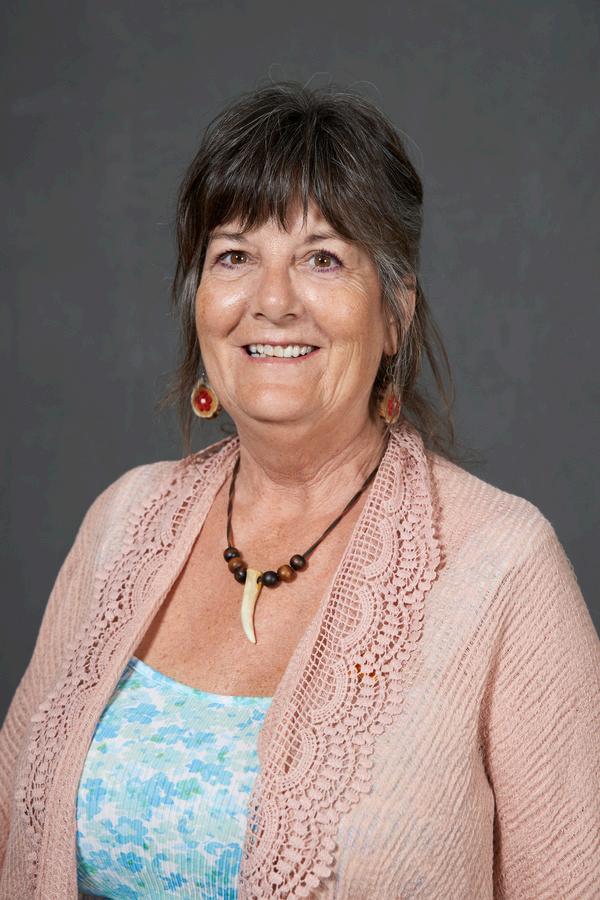
dvocate vels of f their
programming. I have been so pleased to witness the positive change at the NAFC with Jocelyn Formsma as CEO and am excited to witness the continued progress as she ushers the NAFC into a new era.
I would also like to extend my deepest gratitude to the Executive Committee, Board of Directors, and Senate who work tirelessly to serve our urban Indigenous communities nationwide. Our collective efforts give me optimism for the future of our Movement I am certain that our continued collaboration, exchange of knowledge, and advocacy for the needs of urban Indigenous people will drive positive change and ensure a bright future for generations to come
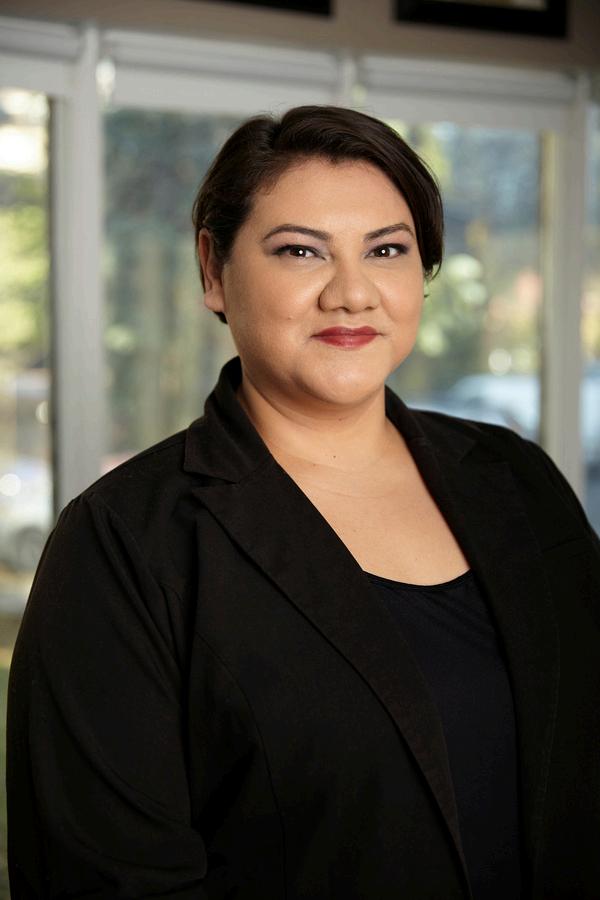
Wachay Misiway, Kwe, Tansi, Tungasugit,
Reflecting on 2023, I feel honoured to be a part of the Friendship Centre Movement and proud of our team at the National Association of Friendship Centres As a collective, through community focus, innovation, and resilience, we continue to bring positive change to urban Indigenous communities from coast-to-coast-tocoast
In a period marked by budget cuts and financial uncertainties, our commitment to urban Indigenous communities and the Friendship Centre Movement has remained unwavering. Despite these and other challenges, our team has remained dedicated to our mission and has consistently sought out additional funding to allow for the continuation of programs which are vital to the communities that we serve
Jocelyn Formsma Chief Executive Officer, NAFC
The renewal of crucial program funding reflects the ongoing trust and support of our partners. Yet, as we navigate through an uncertain economy with the possibility of a federal election on the horizon, we must acknowledge the need for increased sustained funding Our collective knowledge and passion will guide us as we work collaboratively to secure the resources needed, ensuring that we can continue to support the FCM and give a voice to urban Indigenous communities
My heartfelt gratitude goes out to each member of the Friendship Centre Movement for their dedication and belief in our mission. The amazing work that each Friendship Centre does for their community is the driving force behind our efforts. We celebrate our progress and stand united in the face of uncertainties, knowing that with increased sustained funding, we can continue to positively impact the urban Indigenous community nationally and usher the NAFC into a new era
It is our great honour and privilege to serve as Senators for the Friendship Centre Movement across Canada. Our ability to love, care and stand together is our strength, and our ability to step up to our responsibilities has given us a better understanding and compassion to continue our work for the NAFC.
As Senators, we are represented at NAFC, PTA and local Friendship Centre meetings and can contribute to these discussions and work at the national, provincial/territorial, and local levels of our Movement. Our shared vision of empowering Friendship Centres enables us to provide dedicated support and services to Indigenous people living in urban areas.
We continue to send prayers and special thoughts of our love for Senators Helen Hudson-MacDonald (19472022) and Joan Glode (1947-2023) They were both dedicated champions who played a key role in advocating for urban Indigenous people, not only in their respective homelands but across the country We will always be thankful for their contributions and legacy to the Friendship Centre Movement It is in the work that we do today and in the days to come that will keep their memories alive
The Senate would like to give an honourable mention to Senator Adeline Webber on her appointment as Commissioner for the Yukon on May 31, 2023, for a term of five years Senator Webber is an honorary lifetime member of the Skookum Jim Friendship Centre in Whitehorse, Yukon Territory, and has received various other recognitions for her work and advocacy, including the 125th Anniversary of the Confederation of Canada Medal and the Queen Elizabeth II Diamond Jubilee Medal.
We want to thank everyone who has trusted us with this responsibility and say Chi-Miigwech to all our Senators past and present who have shared their vision, guidance, knowledge, and expertise with us. We are forever grateful to our Friendship Centres and to all who work and volunteer daily to keep the doors open to make a difference in the lives of Indigenous people living in urban communities.
All Our Relations,
Senator Adeline Webber, YT
Senator Marge White, BC
Senator Linda Boudreau-Semaganis, AB
Senator Ray Fox, SK
Senator Winston McLeod, MB
Senator Vera Pawis Tabobondung, ON
Senator Dominique Rankin, QC
Senator Myrtle Banfield, NL
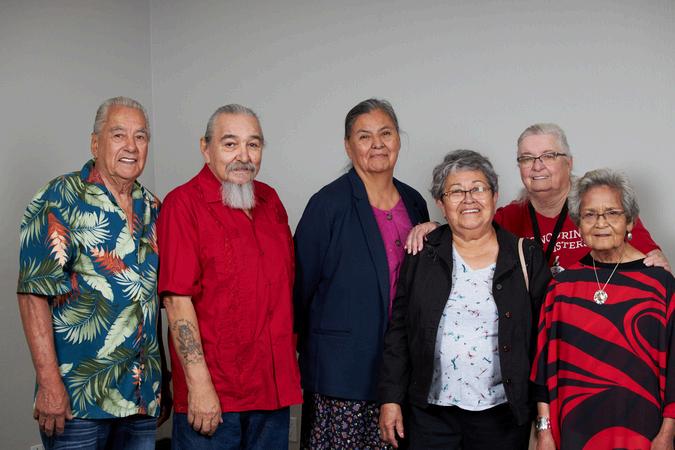
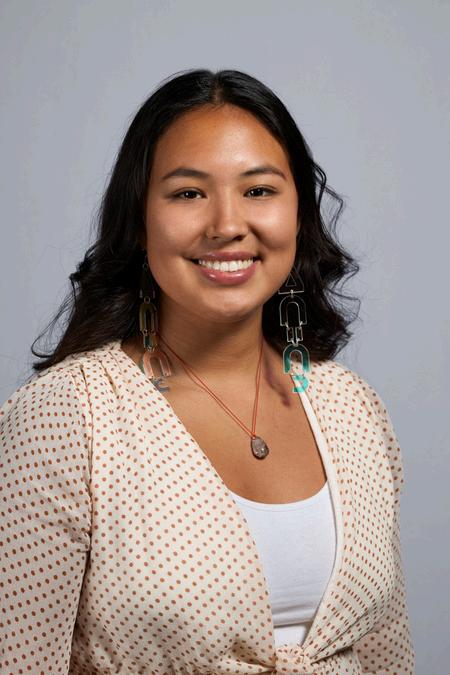
President, Indigenous Youth Council
As I reflect on the past year within the Friendship Centre Movement, so much growth has been able to happen I always remember that my journey within this movement began in my earliest years, as a head start baby! Today I am proud to be able to represent NAFC as the IYC President, and to be able to bring a voice to the table. Indigenous youth have always been the driving force behind the Friendship Centre Movement.
Throughout the past year, I have had the privilege of representing the NAFC at various events and forums, including the United Nations Permanent Forum on Indigenous Issues in 2024, where the central theme of youth empowerment resonated deeply These experiences have reinforced my commitment to amplifying the voices of Indigenous youth and advocating for meaningful change on both local and global scales.
I extend my sincerest gratitude to my fellow youth council members, past and present, whose collaboration and support have been integral to our collective achievements Additionally, I wish to express my deepest appreciation to all Indigenous youth who continue to inspire us with their resilience, passion, and unwavering dedication to building strong communities.
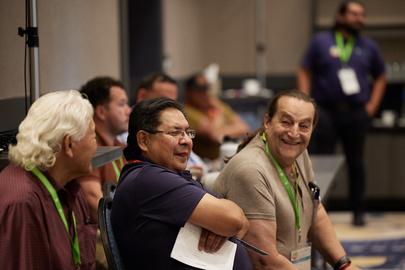
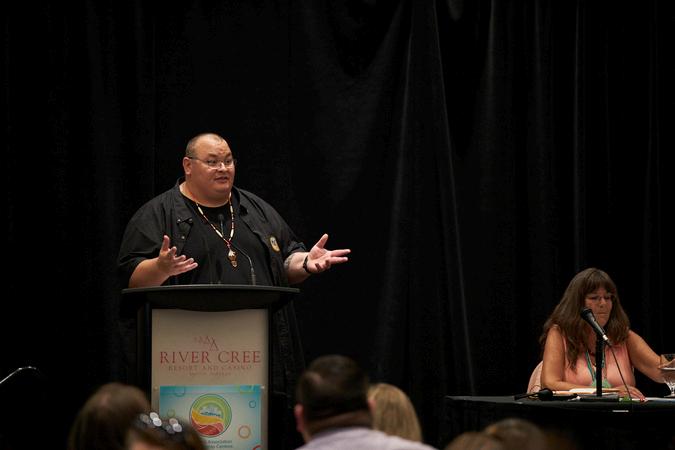
The 52nd Annual General Meeting (AGM) was held from July 16th to 18th, 20 Enoch Cree Nation, Alberta. This was our largest gathering in several years, important topics for the Friendship Centre Movement were discussed.
At the AGM, the following resolutions were passed:
Resolution #2023-07-01 – NAFC to promote proactive action on climate change by implementing sustainable practices for itself; raising awareness about its impacts; advocating for environmentally friendly initiatives for Friendship Centres; collaborating with relevant organizations; and advocating for governments to take necessary action to mitigate the effects of climate change.
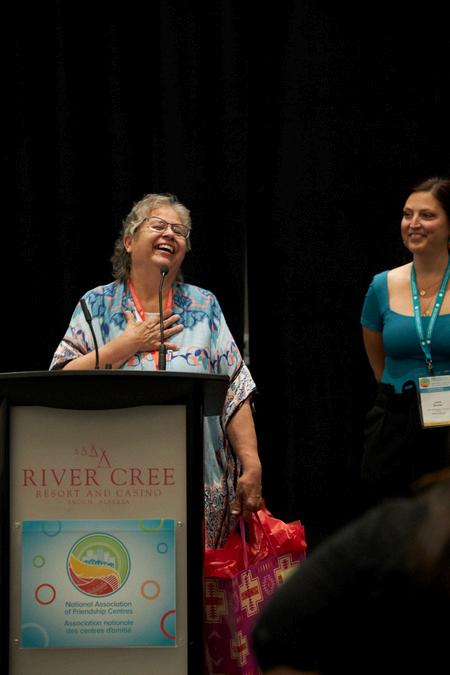
Resolution #2023-07-02 – The original Declaration of Strength and Unity was accepted at the 30th AGM on July 25-28, 2009, in Winnipeg, MB. The NAFC Board of Directors has sought to update and expand the Declaration to reflect the broader principles, values and strengths of the FCM. The membership of the NAFC has endorsed and adopted the revised declaration.
Resolution #2023-07-03 – Since Friendship Centres in Canada are on the frontlines during provincial, territorial, and local emergencies and disasters, including flooding, wildfires, severe weather events and transportation disasters, and most recently the global pandemic, the need for NAFC National Emergency Response Funding has been identified Friendship Centres must have the capacity to address the needs of urban Indigenous people in the immediate, short, and mid-term during and post disaster, and as such need appropriate funding from the federal government and the provinces and territories
Resolution #2023-07-04 – The NAFC Bylaws on Youth Age defined youth as between the ages of 14 and 26 years, but research conducted by the Indigenous Youth Council (IYC) found that most regions recognized youth up to the age of 29, and therefore recommended amending the youth age rage to include those between 14 and 29 years. The recommendation was accepted.
nafc.ca
Resolution #2023-07-05 – Since Friendship Centres in Canada are places of cultural lifelong learning and youth seek out orientation for their studies and career paths as well as a means to pursue those studies, the need for the creation of National Friendship Centre Urban Indigenous Youth Scholarship was identified. This scholarship will support the pursuit of studies at a post-secondary level for youth throughout the Movement; the Senate and IYC will develop non-distinction-based guidelines and criteria for the selection of candidates; the NAFC and the Movement will source funding to perpetuate this scholarship; and recipients will be recognized at the AGM.
Resolution #2023-07-06 – It has been determined that the return to an evergreen funding model that reflects the principles laid out in the Funding renewal engagement for UPIP or an alternative will be prioritized in the negotiations along with incremental increases to account for rising costs and inflation The Friendship Centre Movement has endorsed the proposed changes in the definition of success, the assessment model for funding, and the model for funding development
We are also happy to announce the re-election of Kelly Benning as President and Edith Cloutier as Secretary, as well as the election of Samantha Jack as Youth Executive
We would also like to welcome Tanya Andre, Joanna Ahenakew, and Stacey Howse to our Board of Directors.
At this year’s Annual Meeting, the 2023 award recipients were announced: Nelson Mayer Youth Award – Shiloh Prosser Bonnyville Canadian Friendship Centre Grooviest Friendship Centres Most Activ es
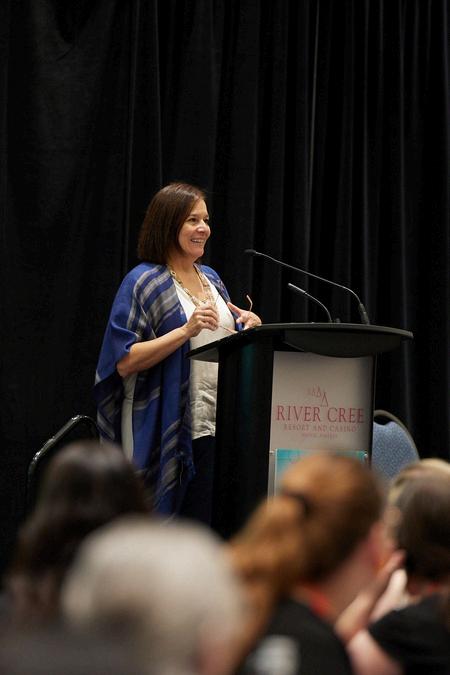
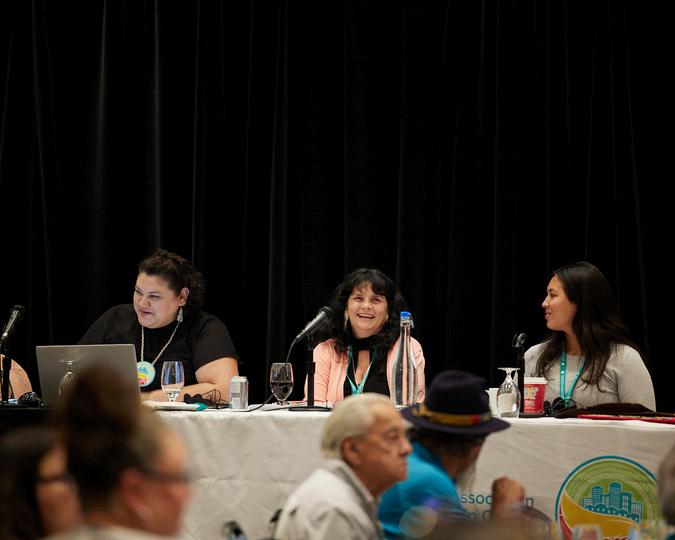
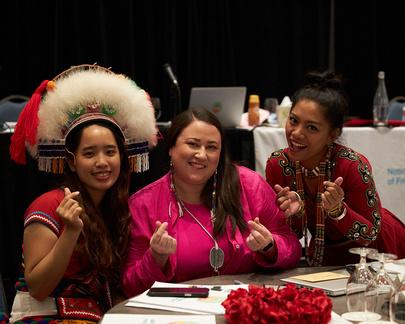

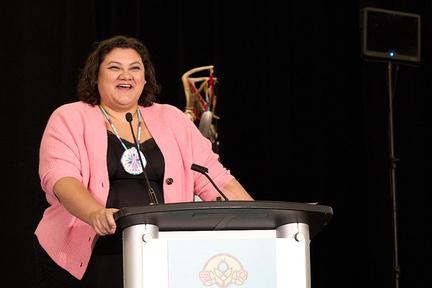
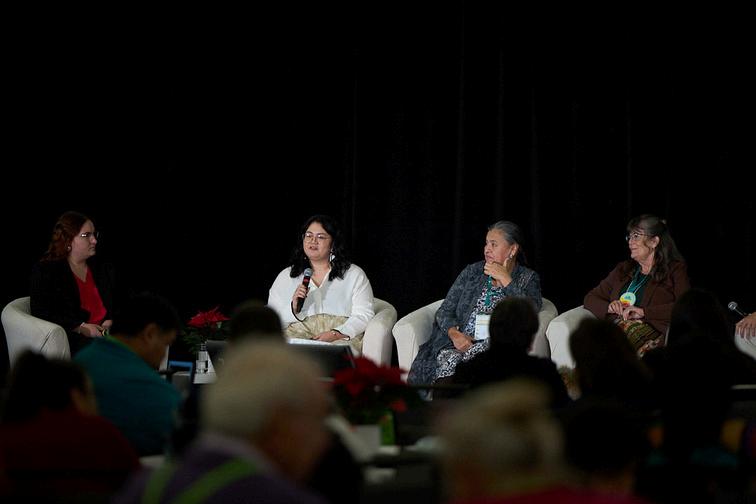
Urban Indigenous Summit: Action for the Next Generation on the f the Algonquin Nation in Ottawa, ON. The gathering was held at the November 27-29, 2023. Over 300 attendees listened to 4 keynote and plenary speakers and participated in 18 workshops, 5 sharing circles, several panels, advocacy week, an Indigenous craft market, and a social evening with entertainment by Indigenous performers
The theme, “Action for the Next Generation”, underlined a key responsibility within Indigenous cultures, which is intergenerational sharing and transfer of knowledge between Youth and Elders As an extension of the 2023 Urban Indigenous Summit, the NAFC was proud to host Advocacy Week, which grew significantly in length, interest, and influence from last year’s Advocacy Day
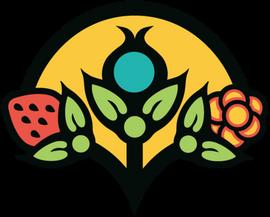
At the event, the NAFC unveiled its official Urban Indigenous Summit logo Designed by Megan Currie, a Dene woman from English River First Nation, the Urban Indigenous Summit logo represents all Indigenous Peoples of Canada while symbolizing the essence and value of the summit Each berry represents an Indigenous group: First Nations are represented by the strawberry, Inuit are represented by the cloudberry, and Métis are represented by the blueberry.
Together the berries embody harvesting our knowledge, sharing amongst our communities, and building networks. The sun overlooking the berries is a symbol of enlightenment as we strive to share knowledge, build capacity, and plan action to continue our vision to improve the well-being of Indigenous peoples living in urban environments.
Representatives of the FCM came together from all coasts for this important urban Indigenous networking event and the NAFC was thrilled to, once again, provide a powerful platform to foster relationships, share best practices, and plan action on issues important to Friendship Centres Throughout the Summit, attendees had the chance to share in strength the ways in which Friendship Centres provide critical support for Indigenous people living in urban, remote and rural communities
A fruitful week was spent sharing, learning, and listening to our friends, colleagues, and partners from the Friendship Centre Movement and beyond! Feedback from the Summit was overwhelmingly positive, with attendees hoping to continue to participate in the future.
Additional information can be found in the 2023 Urban Indigenous Summit Report.
The NAFC is grateful to its partners and sponsors that helped make the 2023 Urban Indigenous Summit possible. If you are interested in sponsoring an upcoming Urban Indigenous Summit, please reach out to Jennifer Rankin at jrankin@nafc.ca for more information.
We look forward to hosting future Urban Indigenous Summits and expect to continue the registration of a sustained annual increase in the number of attendees Additional information regarding the location and dates of the upcoming Summits will be available soon
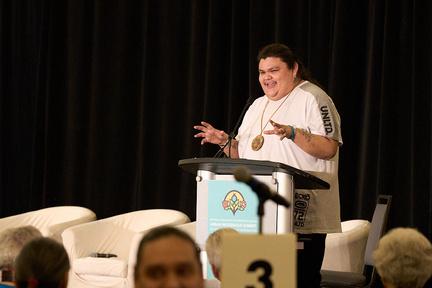
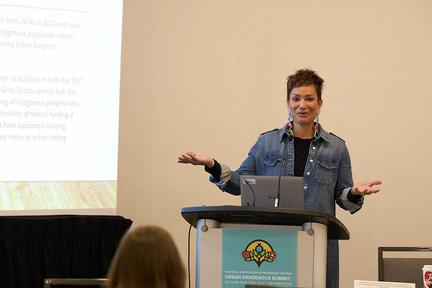
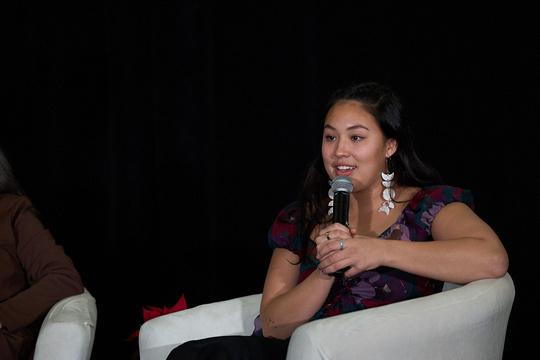
As an extension of the Urban Indigenous Summit, delegates and Youth Representatives from Friendship Centres across Canada worked tirelessly to bring urban Indigenous voices to the table during discussions with political parties. They raised important issues and created relationships that will help pave the way for urban Indigenous representation in policy.
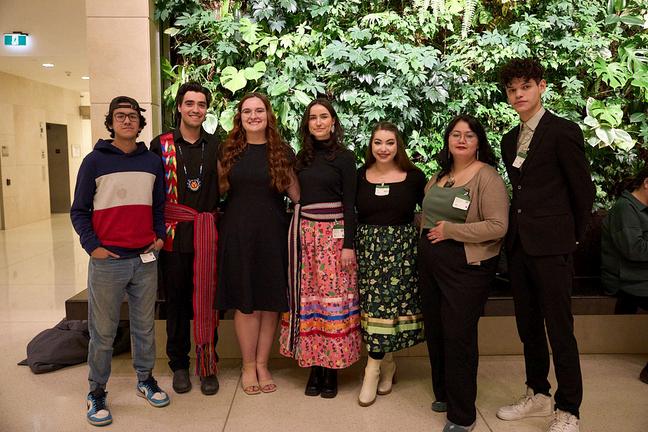
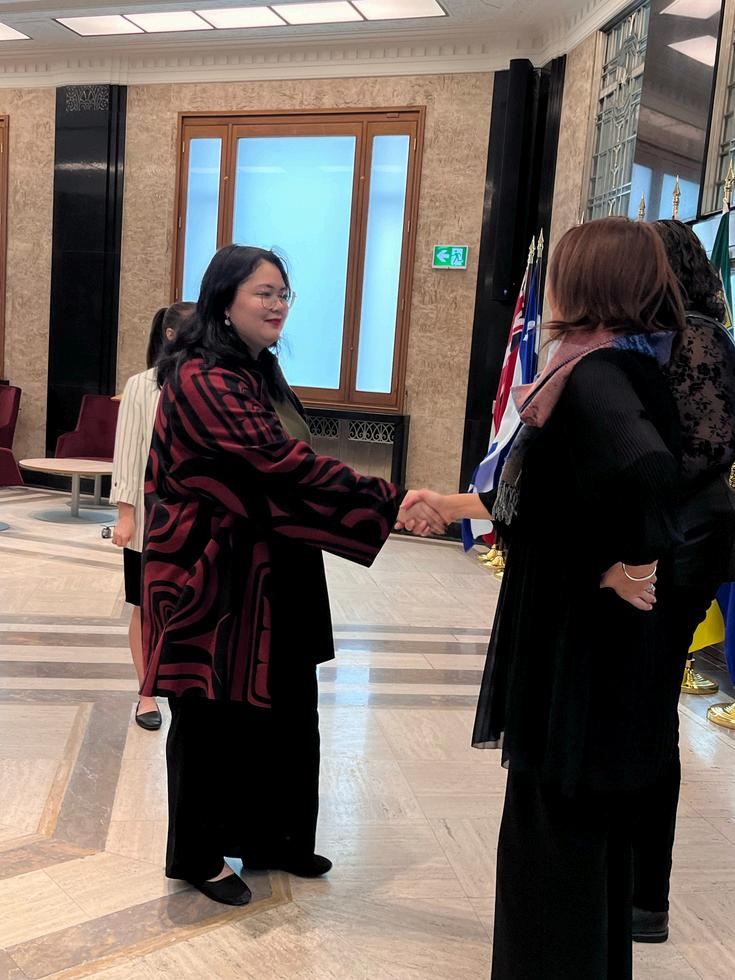
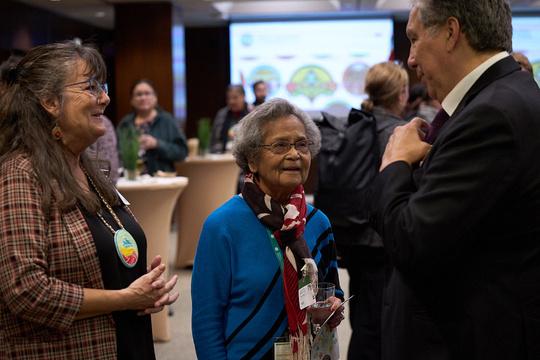
The week was an incredible success and gave Friendship Centres, PTAs and the NAFC the ability to advocate at the highest levels for our needs and amplify the collective work that we do. During Advocacy Week, Friendship Centre representatives were able to meet with the Conservative Party during a roundtable discussion on the hill As well, representatives were welcomed and engaged with during an All-Party Parliamentary Reception that featured political representation from all the major parties Lastly Friendship Centre representatives had the opportunity to participate in
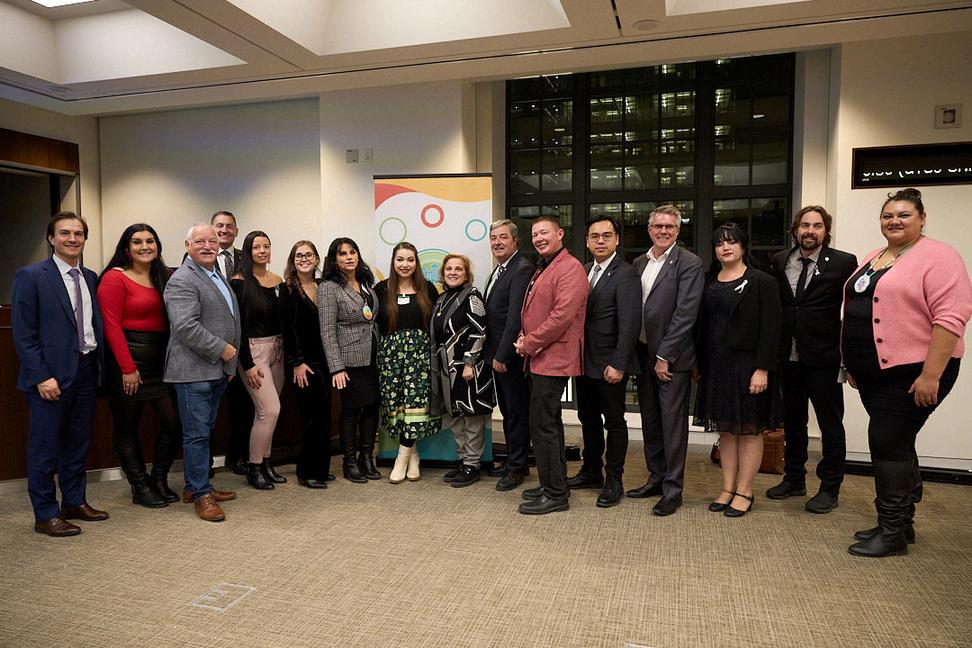
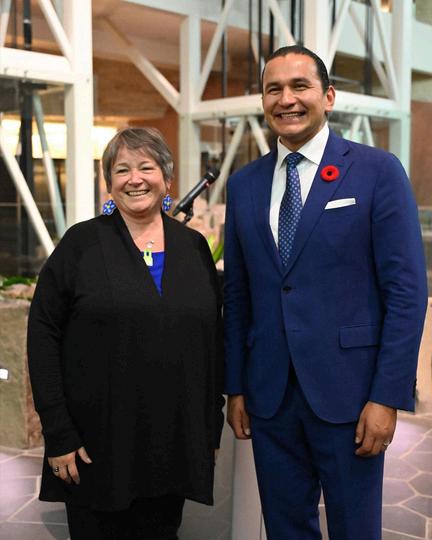
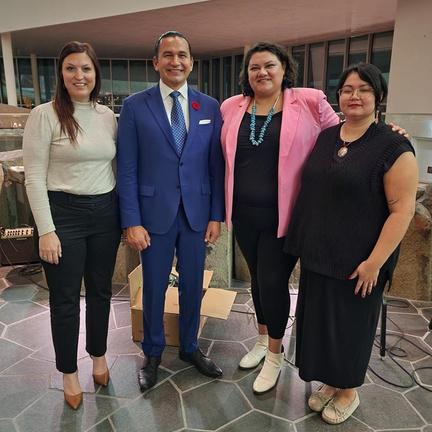
Throughout the year, members of the NAFC Executive Committee and the NAFC Board of Directors meet to address issues pertinent to the Friendship Centre Movement. There is also an annual President and Executive Directors Meeting that is attended by the Board, Executive Committee, NAFC Senior Management, as well as Provincial/Territorial Association and Friendship Centre Presidents and Executive Directors
2023 Executive Meetings:
January 12, 2023 - Online
March 3, 2023 - Ottawa, ON
September 6 & 7 2023 - Banff, AB
October 30, 2023 - Online
2023 Board Meetings:
March 4 & 5 2023 - Ottawa, ON
May 13 & 14 2023 - Edmonton, AB
July 16 2023 - Enoch, AB
November 4 & 5 2023 - Winnipeg, MB
President & Executive Directors Meeting:
November 2 & 3 2023 - Winnipeg, MB
Twice a year, the NAFC Head Office Staff attend a Staff Retreat to work o team building, strategic planning, personal development, and cultur awareness Each gathering brings staff to a different Friendship Centr which allows them to learn about the diversity within the Friendship Centr Movement, as well as the unique programs and services offered at eac Friendship Centre.
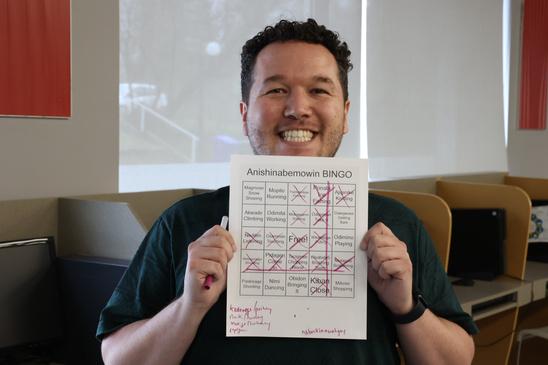
The Spring NAFC Staff Retreat was held from May 2-3, 2023 at the Maniwaki Native Friendship Centre and at Mādahòkì Farm. On the first day of the retreat, NAFC Staff traveled to the Maniwaki FC where they toured the centre and participated in land-based teachings with an Algonquin Elder The second day of the retreat was spent at Mādahòkì Farm, where staff received Cybersecurity Training and listened to a presentation on the state of the NAFC given by CEO, Jocelyn Formsma.
The Fall NAFC Staff Retreat took place from October 2-5, 2023 at the Native Canadian Centre of Toronto. NAFC Staff received a tour of the facility and learned about the centre’s gift shop that features products from graduates of their Aboriginal BEST (Business and Entrepreneurship Skills Training) Program Among the many other highlights of the week were the food a presentation by Kody Doxtater on Tobacco Teachings work on the
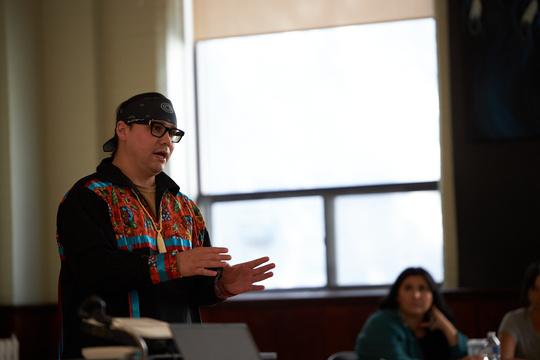
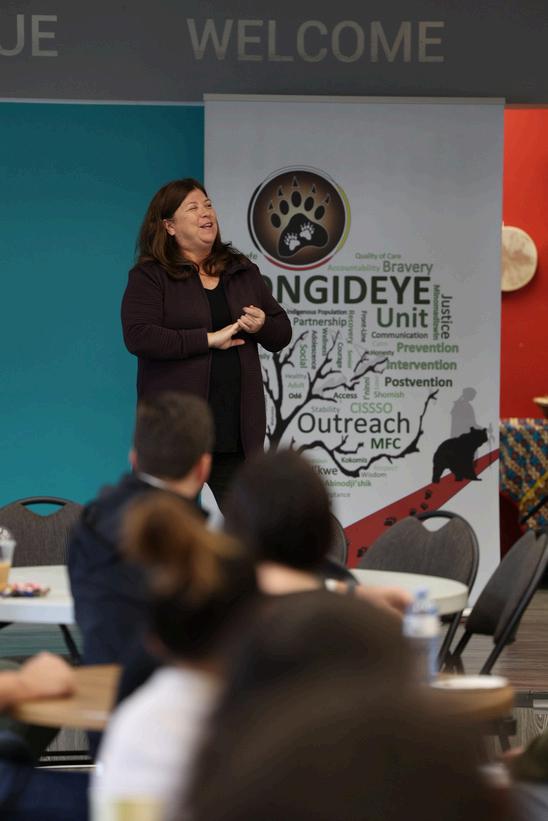
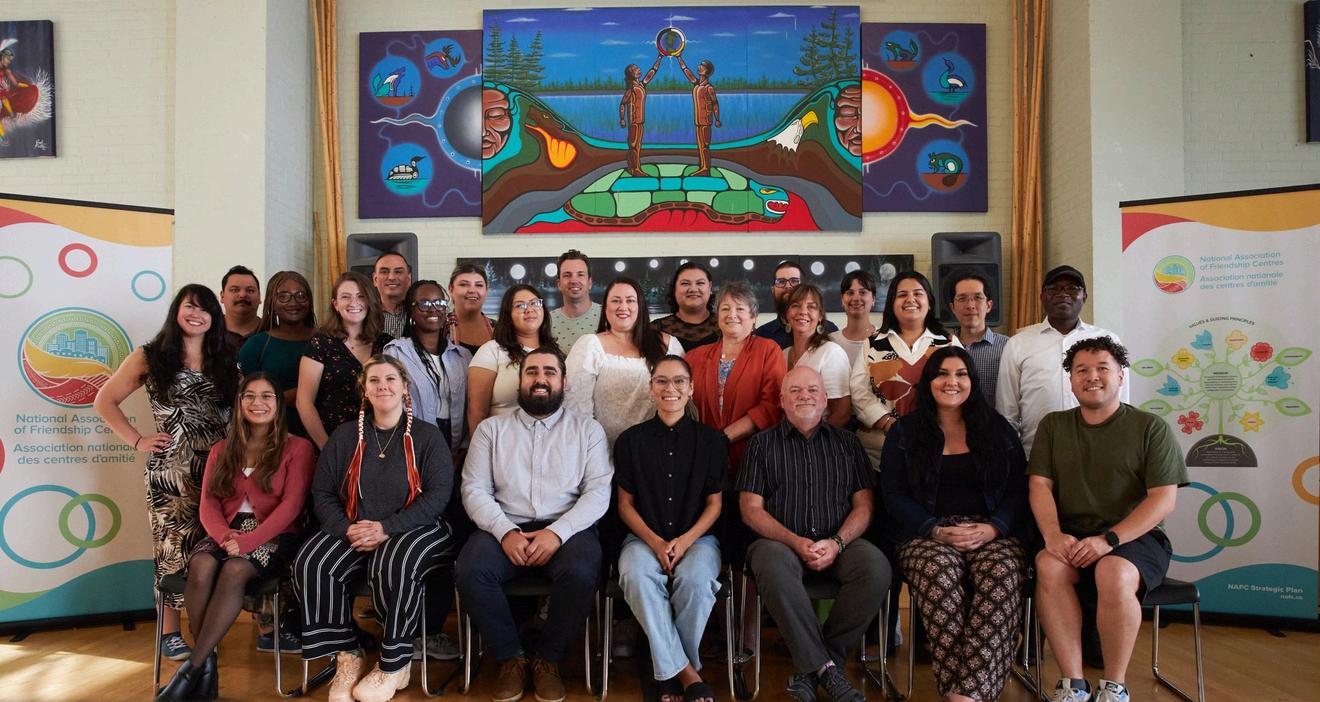
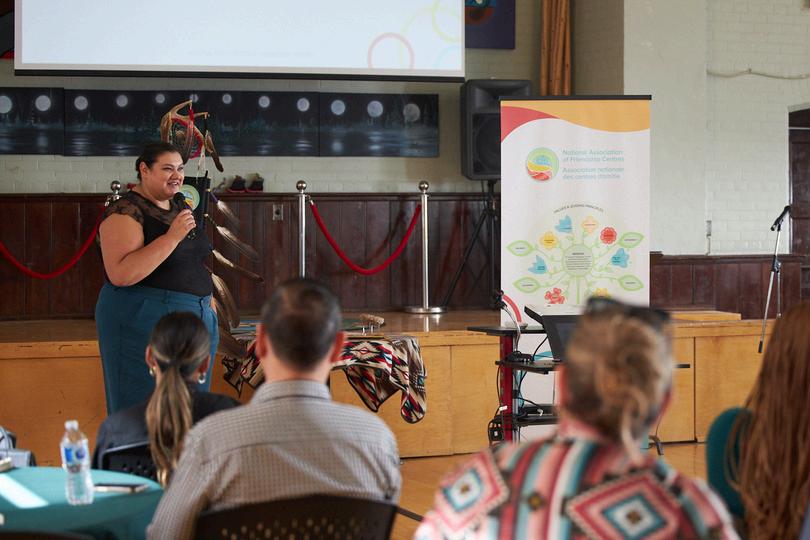
The Programs Department had an incredibly busy year with the administration of $32 million in Urban Programming for Indigenous Peoples (UPIP) funds to Friendship Centres In addition to this, the team managed a growing roster of envelope funding programs totaling nearly $50 million in additional program funding supported by Indigenous Services Canada (ISC), Heritage Canada, Employment and Social Development Canada (ESDC) and the Public Health Agency of Canada (PHAC).
The Programs Department coordinated on-going meetings with Provincial-Territorial Association (PTA) Technicians. During these meetings, the NAFC provided important updates to PTA Technicians, but also worked with the regions to further the collective objectives of the Friendship Centre Movement.
During the 2023 Urban Indigenous Summit, the Programs team led the development and implementation of NAFC Advocacy Week.
The Friendship Centre Movement is in its second year of the three-year UPIP extension, currently operating at $32 million per year With this program ending in 2025, the NAFC is actively advocating for its renewal or for the creation of a similar funding program at the national level. This work has included the development of a UPIP Renewal Business Case that is currently under review. TThe NAFC is also in the process of developing a public ad campaign that targets decision and policy makers with the intention of showcasing the impact of Friendship Centres on urban Indigenous communities. We are also actively engaged in discussions with the ISC UPIP department and other UPIP holders to work on redefining the UPIP terms and conditions, performance, and reporting indicators, and crafting a new program framework that better reflects the realities and needs of urban Indigenous communities and Friendship Centres.
The NAFC is also in the process of developing a public ad campaign that targets decision and policy makers with the intention of showcasing the impact of Friendship Centres on urban Indigenous communities We are also actively engaged in discussions with the ISC UPIP department and other UPIP holders to work on redefining the UPIP terms and conditions, performance, and reporting indicators, and crafting a new program framework that better reflects the realities and needs of urban Indigenous communities and Friendship Centres
These discussions continued with the PTA technicians at the most recent Technicians Meeting in November of this year, in Saskatoon, SK. During this meeting the NAFC updated PTAs on the status of UPIP renewal meetings with ISC and other UPIP holders, the NAFC business case, the proposed new UPIP logic model, reporting indicators, regional advocacy strategies for renewal discussions and regional updates. Finally, the NAFC has participated in two all UPIP recipient gatherings facilitated by ISC, these meetings have sought to bring all UPIP recipients together to discuss renewal strategies as well as support the development of a new logic model for UPIP.
The Final UPIP Report for the 2022-2023 fiscal year has been completed and submitted to ISC
In early 2023, the NAFC was informed that the ICSF extension was approved. Thanks to this, the NAFC received $3 million in additional funding to our previously agreed upon $6 million, bringing the year’s total funding for this program to $9 million. The NAFC proposed an allocation-based funding distribution model to PTAs and FCs for this program. This funding distribution model is similar to the newly proposed UPIP allocation model (70% equality and 30% equity). The proposal was accepted by the PTAs and FCS, and all funds were distributed in May 2023. The team is currently working on the final 2022-2023 ICSF report, and upon its completion will begin preparations for the final ICSF report, which will cover the 2023-2024 period and the wind-down of the ICSF program.
Throughout 2023, the NAFC advocated for additional minor infrastructure funds to support Friendship Centres with minor repairs and renovations. Unfortunately, despite our best efforts, the NAFC was unable to secure additional minor infrastructure support from ISC. However, the NAFC will continue to advocate for long-term minor infrastructure support for Friendship Centres, recognizing that there is a significant need to ensure that centres are well maintained to enable them to properly serve their communities.
SC launched an independent major infrastructure application process which allowed Friendship Centres to apply independently, with 4 centres receiving funding through this program ISC is working with the NAFC as the flowthrough for that funding and, to date, the NAFC has flowed nearly $10 million in major infrastructure funding to those select Friendship Centres The NAFC is aware of the current inflation crisis and has been advocating for funding top-ups for recipients to be able to complete their projects and is also advocating for continued major infrastructure support Unfortunately, ISC has indicated that there would be no additional infrastructure support for the 2023-2024 fiscal year
The NAFC distributed approximately $4 4 million in funding to 48 urban Indigenous social economy initiatives across the country in 2023. Among these initiatives, 29% of funded organizations had no existing social enterprise and were looking to complete their research and business development processes, 37% of funded organizations had already completed their research and development processes and were ready to start their social enterprise, and 33% had an existing social enterprise and were looking to grow and scale their operations.
Projects funded under the IRP collectively serve both urban Indigenous communities and the general population, with a specific focus on Indigenous women, girls, gender diverse individuals, Indigenous men, and Northern Indigenous communities. These social purpose organizations (SPOs) actively address a range of community needs including community/social services; creative arts; cultural/spiritual services or revitalization; youth services or programming; health services; wrap-around support for the urban Indigenous community; and housing, employment, and skills training

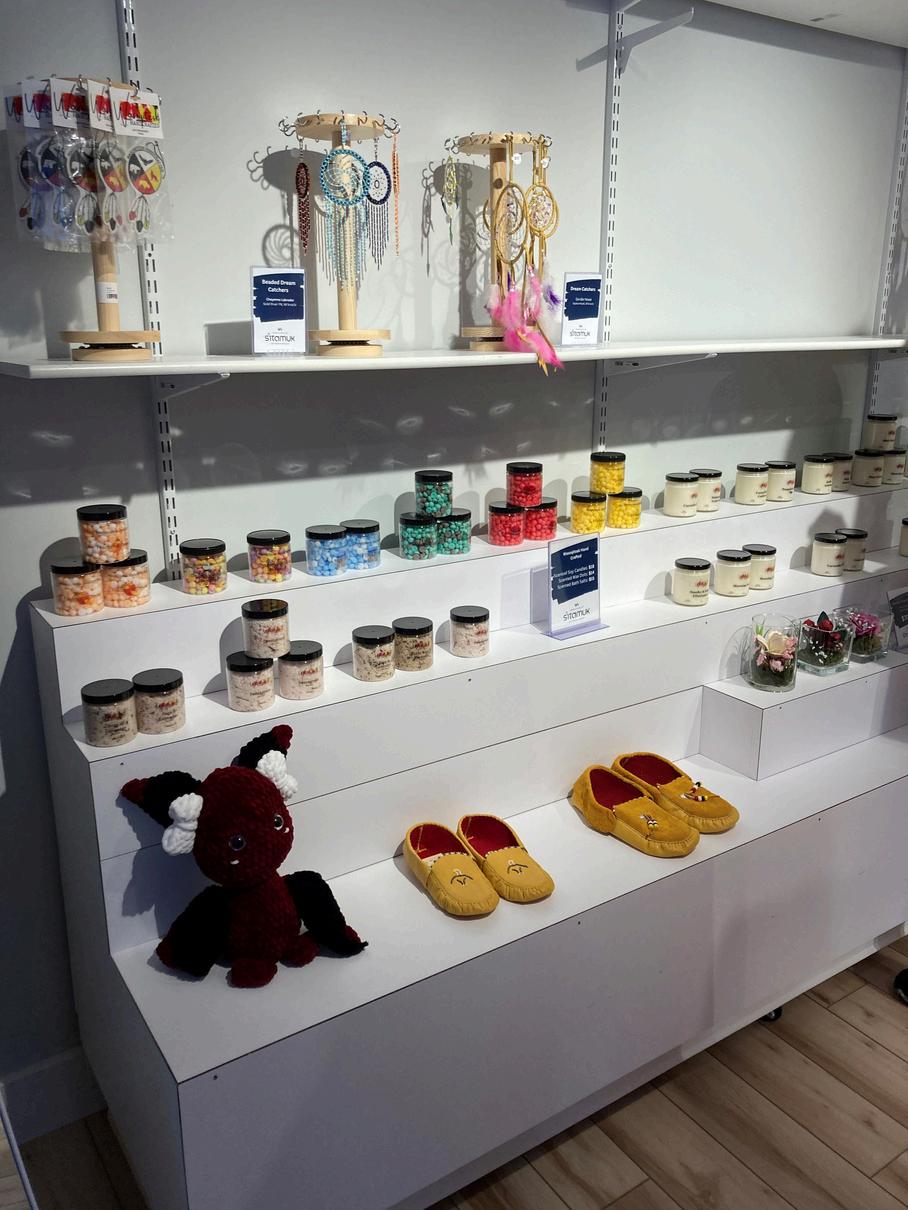
The NAFC received $3.75 million of funding from Heritage Canada to distribute to FCs and PTAs in support of the development and delivery of Indigenous language programs. We are working to establish best practices for these programs with the goal of reclaiming, revitalizing, strengthening, and maintaining Indigenous languages.
Applications for the Indigenous Languages Program closed on 30 June 2023, and the NAFC received a total of 34 applications from Friendship Centres across Canada FCs and PTAs could apply for up to $90,000 per year over a 2-year period (totaling $180,000) to support an existing or new Indigenous languages program Applications were reviewed internally, and 23 Centres were approved for funding
Due to limited funding and the number of eligible applications received, regional prioritization was necessary and successful applications were selected based on regional parity Regional distribution of funding to Friendship Centres is as follows: 3 centres from Saskatchewan, 4 from Alberta, 2 from the Atlantic, 4 from British Columbia, 4 from Manitoba, 2 from the Northwest Territories and Nunavut, 1 from Ontario, and 3 from Quebec.
Program funds are currently being distributed to the approved centres. In accordance with the conditions of the funding agreement, funds are being released in 2 phases, with 70% of the funds currently being distributed and the final 30% of the funds paid out in the next fiscal year (2024-2025).
The NAFC is seeking additional funding to support more programs and centres, specifically the ones that could not be funded during this round. Eligible applications that were denied due to a lack of funding will be given priority if additional funds become available.
Association of Friendship Centres
The NAFC received nearly $8 million in direct Mental Health Support Program funding aimed at supporting member-FCs in expanding their capacity to provide trauma-informed mental health and cultural support services. This program is funded through a merger of funds provided by Indigenous Services Canada (ISC), First Nations and Inuit Health Branch (FNIHB), and the Public Health Agency Canada (PHAC). The funding is meant to support pre-existing mental health initiatives by integrating cultural components while fostering knowledge mobilization and information sharing to better understand urban Indigenous mental health needs, Increase mental health programming and capacity at Friendship Centres and Provincial/Territorial Associations. This is to ensure that all Indigenous individuals, regardless of status, residence, or intergenerational trauma, can safely address mental wellness issues related to their lived experiences. The program also aims to address mental health concerns and promote mental wellness for all Indigenous people in a community-based, holistic, and integrated manner
The NAFC launched a direct application process for this program and conducted an internal review process of all applications In total, 27 projects were funded, and complete regional allocations were distributed to Alberta and Saskatchewan who requested to administer the mental health funding themselves To date, the NAFC has distributed over $7 million in funding
The following table provides a breakdown of funded mental health projects by region:
The NAFC was recently awarded $2.5 million for the Health Navigation Program to help support pilot projects in healthcare that address anti-Indigenous racism. This funding can be used to fund positions in health navigation or upscale existing projects and positions for health navigation. The program is intended to help improve the safety and accessibility of health services for Indigenous people, facilitate their equitable access to healthcare services, and ensure that they can access hospitals and healthcare systems in a culturally safe manner. Through the application process developed by the NAFC, 23 projects were approved for funding. All approved FCs and PTAs have since received their allocated funds. The NAFC has been working with ISC to show the need for a long-term health navigation strategy and are assisting them in making the case for both a program extension and renewal.
Below is a regional breakdown of all funded programs:
On behalf of Friendship Centres, the NAFC informed Employment and Social Development Canada (ESDC) about the urgent need for a timely SSLP renewal announcement since staff positions and youth programming rely on a timely announcement of program renewal. ESDC responded to our concerns and provided an SSLP program extension until March 31st, 2024. This extension will allow for maximum financial flexibility. Unfortunately, there has been no news of any additional funding for SSLP, but the NAFC will continue to advocate on behalf of Friendship Centres
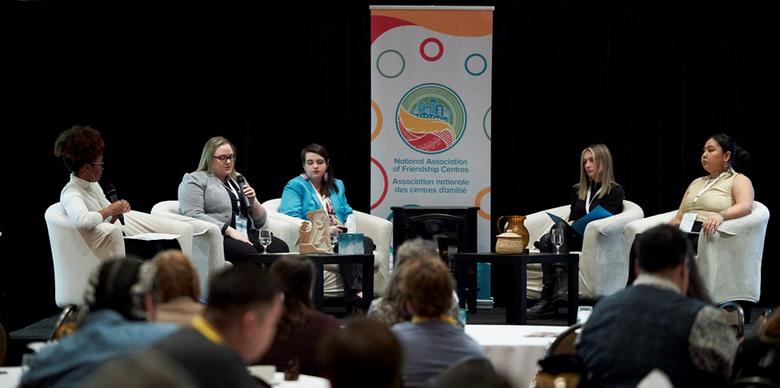
CreateAction – a work experience program for youth facing barriers to employment – is concluding its fifth and final cohort. In the past year, the NAFC has provided wage funding for 12 placements at FCs across the country Additional placements were hosted with our partner, the Canadian Community Economic Development Network (CCEDNet), for a total of 42 placements over the past year In addition to these placements, the NAFC and CCEDNet delivered peer learning workshops and other educational opportunities for youth on topics such as financial wellbeing, employee rights in the workplace, setting healthy boundaries at work, Indigenous approaches to community development, art as therapy, and more. CreateAction
In September 2023, the NAFC was granted $4 million from Employment and Social Development Canada for the Community Workforce Development Program The program aims to pilot local approaches to community workforce planning in rural and/or remote communities across the country by bringing together FCs and PTAs, community-based organizations, and employers across industries and sectors The NAFC’s goal is to strengthen urban Indigenous-led economic and community workforce development
Forest Fire Relief
In June 2023, the NAFC submitted an emergency proposal to ISC for $1.2 million in Wildfire Emergency Support for Friendship Centres that were directly affected by wildfires and/or supporting Indigenous people who were affected or displaced In August 2023, the NAFC received notice that our proposal was granted In August, the NAFC distributed funds to FCs in all affected regions including BC, AB, SK, QC, NWT, and NS
The NAFC Policy and Research Department has been working on several portfolios which cover topics from climate change and emergencies, early learning and childcare, Indigenous peoples and the social economy, and MMIWG2S+MB. The following is an overview of the many activities, both completed and in progress, that both teams have been busy creating, maintaining, and supporting in 2023.
Below is a list of some of the events, conferences, and roundtables that the Policy and Research teams attended, supported, and presented at this year:
Honouring Indigenous Climate Leadership Roundtable
Indigenous Centre for Cumulative Effects National Conference
National Strategy for Children and Youth Roundtables, Presentation, and Briefing
Early Learning and Childcare Information and Engagement Session
Senior Official’s Committee Responsible for Human Rights (SOCHR) Meeting with Indigenous Representatives on the Convention on the Rights of the Child
National Roundtable on Family Support
House of Commons Standing Committee on Children’s Health Briefing
Canadian Housing and Renewal Associations (CHRA) Congress
National Indigenous Physical Activity & Wellness (NIPAW) Sport Conference hosted by Indigenous Physical Activity and Cultural Circle (IPACC)
The Policy team has been working to advance the Urban Indigenous Climate Strategy by conducting surveys and hosting broad FCM engagement sessions and workshops. The input gathered through these engagements will allow the NAFC to map out Friendship Centre led climate change initiatives, emergency response and green initiatives; as well as highlight the work done by Friendship Centres and PTAs. The NAFC will compile the insight and perspectives from engagements into a comprehensive policy report amplifying urban Indigenous voices and centering Indigenous knowledge and rights in the climate action discourse This report will explore the role of Friendship Centres and PTAs during climate emergencies It will also showcase urban Indigenous knowledge, practices, and actions, exploring how a wide range of topics intersect with climate change including gender, housing and homelessness, poverty, human rights, environmental racism, and emergency management
A policy report was developed to examine the current state of child welfare funding, providing perspectives based on urban Indigenous realities in Canada. This report explores federal and provincial funding infrastructures, mapping the fiscal ecosystem of funding for First Nations, Métis, Inuit and urban Indigenous children, youth and families, particularly in comparison with funding and services for non-Indigenous children, youth, and families. The report highlights the socioeconomic impacts of unstable and inequitable funding in the current fiscal ecosystem. It reveals jarring fiscal inequities, inconsistencies, and gaps, calling attention to the ongoing violation of the inherent rights of all First Nations, Métis, Inuit and urban Indigenous children, youth, families and communities.
The report aims to facilitate a better understanding of the impact of unstable, inequitable funding to promote substantive equality within the context of provincial/territorial and federal funding for urban Indigenous services Intended to be a roadmap to positive change – the report shines a light on fiscal inequities to bring about structural and substantial change to the fiscal ecosystem that reduces inequity, keeps children with their families and communities where possible and improves outcomes for children and youth It explores the ways in which funding models can be revised to enable a holistic, equitable, cross-jurisdictional service framework that upholds the rights and best interests of First Nations, Métis, Inuit, and urban Indigenous populations across Canada and supports their safety, wellbeing and prosperity.
The NAFC policy team prepared a Bill C-35 briefing to support Regroupement des centres d’amité autochtones du Québec (RCAAQ) members who were invited to participate in a panel discussion on the study of Bill C-35 The briefing provided an initial overview and analysis of Bill C-35, An Act Respecting Early Learning and Child Care in Canada, exploring the government’s vision, goals, commitments, and funding agreements.
Submission on the United Nations International Convention on the Elimination of All Forms of Racial Discrimination
In preparation for Canada’s combined twenty-fourth and twenty-fifth periodic report on the United Nations (UN) International Convention on the Elimination of All Forms of Racial Discrimination (ICERD), the Government of Canada contacted various civil society organizations seeking their views and insights. The NAFC provided an urban Indigenous perspective on the proposed outline based on issues raised by the UN’s ICERD in their Concluding Observations, addressing key issues to prioritize for inclusion in the report and identifying Canada’s main successes and challenges related to urban Indigenous communities nationally This submission laid the groundwork for the development of a more comprehensive overview of racial discrimination in Canada and its wide-range of impacts on urban Indigenous communities and organizations
In Fall 2023, Justice Canada released the United Nations Declaration on the Rights of Indigenous Peoples (UNDRIP) Act action plan, which has themes of reconciliation and human rights that focus on making changes within Canadian laws and policies to reflect the goals of UNDRIP. The NAFC is listed as a lead in this action plan to make changes for Urban Indigenous communities across Canada.
The NAFC Urban Indigenous Justice Strategy is currently underway. We are in conversations with Justice Canada regarding the Indigenous Justice Strategy, and, at the end of December 2023, the NAFC submitted their recommendations for Justice Canada’s Indigenous Strategy.
The Policy team developed an official internal policy for the NAFC’s international engagement outlining the core mechanisms the NAFC will use to engage with the Friendship Centre Movement, Indigenous organizations, and government and international organizations By mapping out the influence and impact of stakeholders, and clearly outlining our objectives, mechanisms, and targets, the NAFC’s Engagement Policy will support the NAFC and FCM in advancing the rights, empowerment, and protection of urban Indigenous communities.
In November, Nathalie Bryant an Indigenous Academic from Australia presented to the NAFC staff on her work on creating an Indigenist Critical Policy Analysis (ICPA) framework, a valuable tool used to evaluate policies and their alignment with Indigenous perspectives. It considers the complex social and political landscape, including the historical impact of settler-colonialism and the intricacies of government structures. Closely aligning policy assessment with the principles and articles of UNDRIP, this approach aims to identify how these structures might undermine Indigenous health and well-being.
The NAFC and Hawaii Investment Ready hosted a side event for the 21st Session of the United Nations Permanent Forum on Indigenous Issues to facilitate a meaningful discussion on the role of business, Indigenous communities, and the social economy. Showcasing the work and successes of Indigenous social economy initiatives, presenters discussed how their respective social enterprise encompasses UNDRIP articles and advances Indigenous peoples’ rights The event explored the global role Indigenous people play in creating sustainable and collective wealth in their communities, and how Indigenous-led social economy initiatives further advance Indigenous peoples’ rights and autonomy
As Friendship Centres provide housing and wrap-around services to Indigenous peoples living in urban, rural and northern communities, the relationship between NAFC and NICHI continues to strengthen as a newly incorporated national collective. The Policy team supported the inaugural NICHI Day held on April 17, 2023, in Winnipeg, Manitoba which was a collaborative event between several Indigenous housing providers. This inaugural event was split between community engagement in the morning and the election of its first full-term board of directors.
National Association of Friendship Centres
The NAFC has partnered with the Canadian Housing and Mortgage Corporation (CMHC)’s Indigenous Shelter and Transitional Housing initiative to assist Friendship Centres with applications to support the construction of a minimum of 38 shelters and 50 transitional homes across Canada This includes urban areas and the North The program’s main focus is Indigenous people escaping gender-based violence such as Women, their children, and those belonging to 2SLGBTQQIA+ communities
In March 2023, the NAFC Policy Team established a MMIWG2S+ Steering Committee with regional representation to inform the development of an implementation process to enhance the safety of Indigenous women, girls, Two-Spirit, and gender-diverse people in urban, rural, and remote communities
The NAFC Policy Team and MMIWG2S+ Steering Committee has been working closely with Kingfisher Consulting to co-develop a strategic plan and playbook to guide this initiative In October 2023, an in-person gathering was held in Wendake, QC to discuss how to implement action items that are within the scope of Friendship Centres and support the well-being and safety of Indigenous women, girls and 2SLGBTQQIA+ people in each of our respective communities.
In November 2023, the Policy Team hosted a series of Sharing Circles at NAFC’s Urban Indigenous Summit which included live scribing and story weaving Members from the Friendship Centre Movement were asked how Friendship Centres can empower communities to be safe, secure, and successful communities for Indigenous women, girls and gender diverse relatives A virtual follow-up workshop will be hosted in January 2024 to share the vision created, honor the contributions, and connect to how we can embody this shared vision
With the development of the MMIWG2S+ Implementation Plan well underway, this initiative will roll out in 2024.
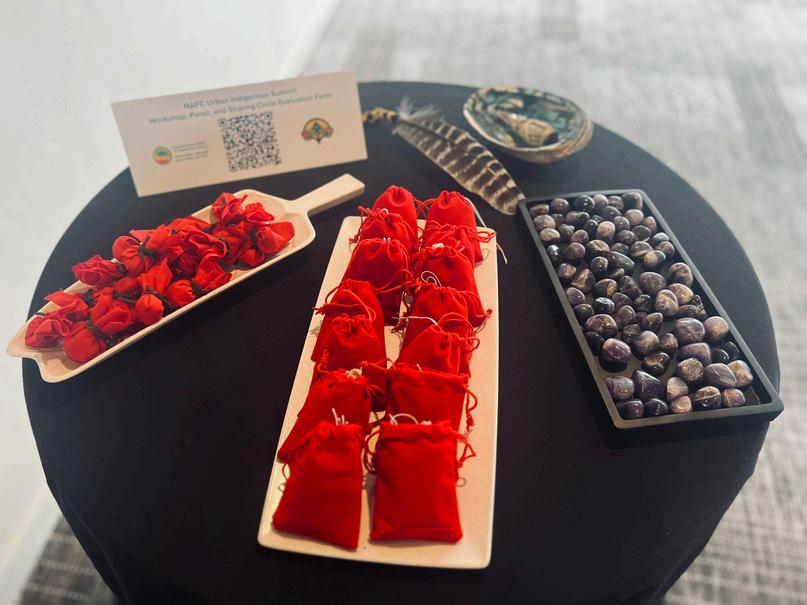
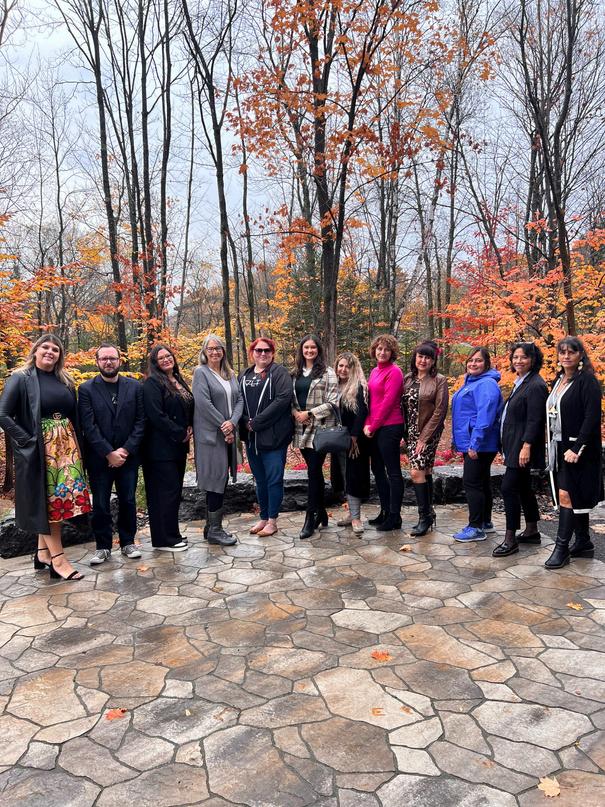
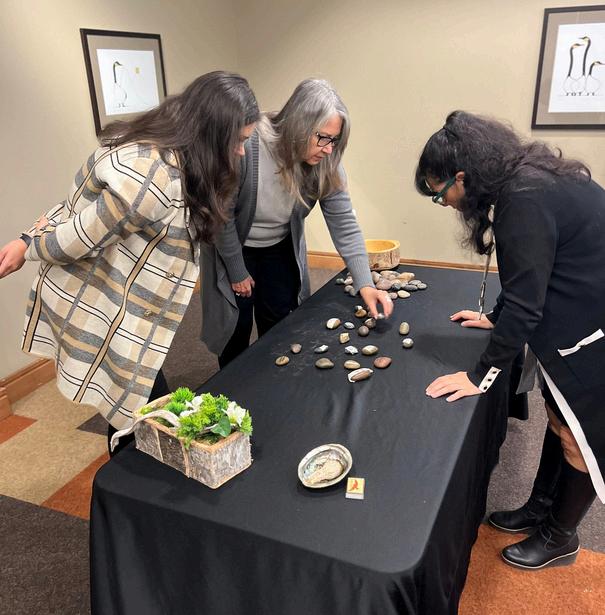
The NAFC continues to be an active member of t MMIWG2S+ Urban Action Group (UAG) which is comprised of members from across Canada The mandate of this group is develop and accelerate the Urban Framework for the Nation Action Plan (NAP) to eliminate violence against *Indigeno women, girls and Two-Spirit, Lesbian, Gay, Bisexu Transgender, Queer, Questioning, Intersex and Asexu (2SLGBTQQIA+) people, in response to the National Inqu into Missing and Murdered Indigenous Women and Girls a the 61 Calls for Miskotahâ (change) specific to the Métis Natio
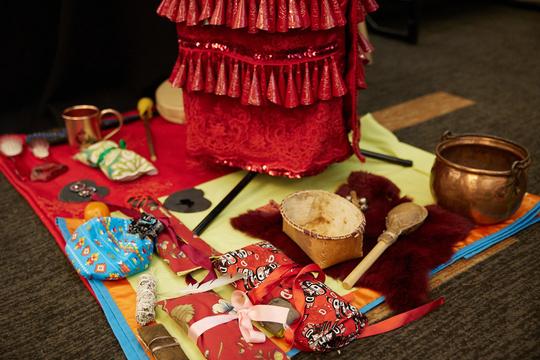
In November 2023, NAFC staff attended and supported the National Summit for the MMIWG2S+ Urban Action Group
1.10 and 1.7
The Policy team supported two Friendship Centre-specific engagement sessions regarding the implementation of key actions to address the crisis of Missing and Murdered Indigenous Women, Girls, and 2SLGBTQQIA+ persons.
In collaboration with Indigenous enterprise, Innovation 7, an engagement session was held on Call for Justice 1.10 to discuss potential oversight mechanisms. Friendship Centres’ input into Call for Justice 1.10 is vital to help all levels of government and Indigenous partners track progress and uphold accountability in implementing the National Action Plan (NAP) and the Calls for Justice from the National Inquiry on MMIWG2S+.
In addition, the NAFC invited members of the MMIWG2S+ Implementation Steering Committee to meet with Jennifer Moore Rattray, Ministerial Special Representative on Call for Justice 1 7 to begin the conversations on the vision of an Ombudsperson’s Office As part of our responsibility to implement the actions outlined in the National Action Plan, the NAFC will continue to support and bring together members to speak about their lived experiences and offer concrete solutions to accelerating implementation of the Calls for Justice
The NAFC has been actively involved in the development of distinctions-based healthcare legislation within the Indigenous Health Legislation group. Throughout the development process, the NAFC has been included on the Intersectional table meetings that include key discussion areas such as inclusivity and safe spaces, social determinants of health, and traditional health/culture.
The NAFC attends bi-weekly meetings with the First Nations and Inuit Health Branch (FNIHB) AntiIndigenous Racism Committee The committee is comprised of several Indigenous organizations who advise on the Government of Canada’s next steps to address anti-Indigenous racism in healthcare
The NAFC also supported the National Dialogue on Data: Addressing Anti-Indigenous Racism in Canada’s Health Systems from January 24-26, 2023, hosting the Urban Indigenous Perspectives panel which featured Jocelyn W Formsma, Dr Janet Smylie, and Amélie Lainé as speakers
The NAFC completed consultation and urban advocacy with the Healthcare Excellence Canada Design Collaborative Advisory Circle. In addition, NAFC has been named to the Environmental Scan Working Group. Here, the group steered direction and provided feedback on HEC’s development of the collaborative design. NAFC then sat on the First Nations, Inuit, and Metis Advisory Circles to ensure urban representation.
End of Life Care: Partnership with Health Canada
Health Canada’s Indigenous End of Life Care has two ongoing streams in which NAFC is engaged The first is the Palliative Care Framework and the second is Supporting the Foundations of Indigenous Engagement on MAID. The NAFC will be supporting the work on the Palliative Care Framework and all data gathered will be housed and owned by the NAFC.
The Research Department has been finalizing a draft of the NAFC Community-Driven Research Framework as part of the NAFC Research Strategy The NAFC Community Driven Research Framework contains information on how the NAFC intends to conduct such research as well as a list of terms and definitions It is based on the NAFC Guiding Principles and Values from the Strategic Plan as they relate to communitydriven research This strategy will cover topics such as the development of a Community Driven Research Advisory Circle that will host a Research Ethics Board The Research team has also been working closely with the Data team to ensure that the NAFC Research Strategy aligns well with the Data Strategy The teams are also working together to develop information governance practices at the NAFC.
In partnership with the Indigenous Sport Unit at Sport Canada, the NAFC supported the Stream Three Review Committee process for the Reconciliation and Strength for Indigenous Women, Girls, and 2SLGBTQI+ People Through Sport fund This fund allocates $2 5 million annually to Indigenous organizations and communities to provide recreational programming that supports the MMIWG Calls for Justice. NAFC took part in Sub-Group 1: British Columbia, Alberta, and Yukon applications.
nafc.ca
Thanks to the Canadian Women’s Foundation’s Safer + Stronger grant, the NAFC has been working towards updating the New Journeys website and providing curated lists with COVID-19 gender-based violence-specific resources

In collaboration with contractor, Zoey Roy, the Research Department was released the English version of the COVID-19 resource list (the French version is in production and will be available soon). The NAFC was also awarded an extension for this grant and additional funding of $150,000. With this additional funding and extension, we will be continuing our collaboration with Animikii on the New Journeys website and content updates, specifically the Services and Resources sections.
The Research team worked with the UAKN and supported the release of the UAKN Compendium: Research for a Better Life in March 2023.
To learn more, visit https://nafc.ca/research/urbanaboriginal-knowledge-network or https://uakn.org/
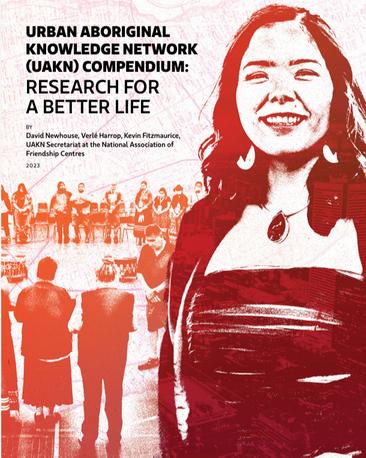
The NAFC successfully submitted a proposal to Women 21 to highlight the history and experiences of urban Indigenous w in the Friendship Centre movement Sisco & Associates, based in g the environmental scan which was a combination of a series of i rt has been completed and we are working towards its publication The next steps of the project will consist of a series of engagements to share the findings from the report, as well as training opportunities to support the next Advocacy Day, this upcoming year
Through a partnership with the Office of the Federal Housing Advocate, the NAFC Research Team will be conducting a small research project that focuses on the experiences of members of the urban Indigenous community This project will highlight the voices of those who use Friendship Centre services and who lived or have lived in encampments The research will be conducted with an Indigenous worldview and through an intersectional lens This is also an opportunity for capacity development within the Friendship Centre Movement on how to conduct community-driven research with the development of a training guide and mentoring from NAFC staff and Friendship Centre staff This is envisioned as a reciprocal learning process
A data strategy outlines actions that will bring us from where we are now to realizing our common vision:
As Indigenous information leaders, we honour our traditions by using stories to provide an understanding of the urban realities and the Indigenous context. Our stories empower communities, promote innovation, and provide supports that gives us strong self-determination and self-sustaining direction.
And is guided by these principles:
1 Respect the information we are gifted
2 Ensure urban Indigenous peoples are represented fairly
3 Share the stories of urban Indigenous peoples
4 Ensure our data accurately represents urban Indigenous realities and values
5. Provide resources, training and minimize undue burden.
6. Reflect and look towards the future. (Sustainability)
7. Include diverse views and be culturally informed.
NAFC will be reaching out to its membership to create a data advisory group who will meet annually to continually develop NAFC’s data strategy. Please visit nafc.ca/data for more information and contact us if you are interested
Community Driven Data Collection aims to meet the calls to action by UNDRIP, the TRCs and the National Action Plan for MMIWG2S+ by growing data capacity and expertise within Friendship Centres with the ultimate outcome of addressing data gaps and developing relevant indicators We launched the ‘Why We Collect Data’ campaign at this year’s summit to be transparent about data collection, how it is used, and why it is important. In the new year, we will be hosting informational webinars, data specific training, developing supporting standards, and bringing folks together for knowledge sharing. Please visit nafc.ca/data for more information and do not hesitate to reach out if there are specific topics or training you would be interested in.
Bridging Across Canada offers a database application for Friendship Centres by Friendship Centres Each Centre has their own private access and is the owner of their data The application is user-friendly, supports program coordination, centralizes information, and automates reporting
The project is a partnership between NAFC, Mi’kmaw Native Friendship Centre and Membertou Geomatics Solutions Any Friendship Centre is welcome to join Please visit https://nafc ca/data/ for more information and contact us if you would like to book a demo.
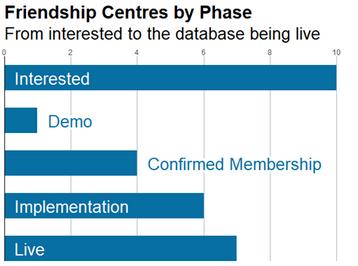
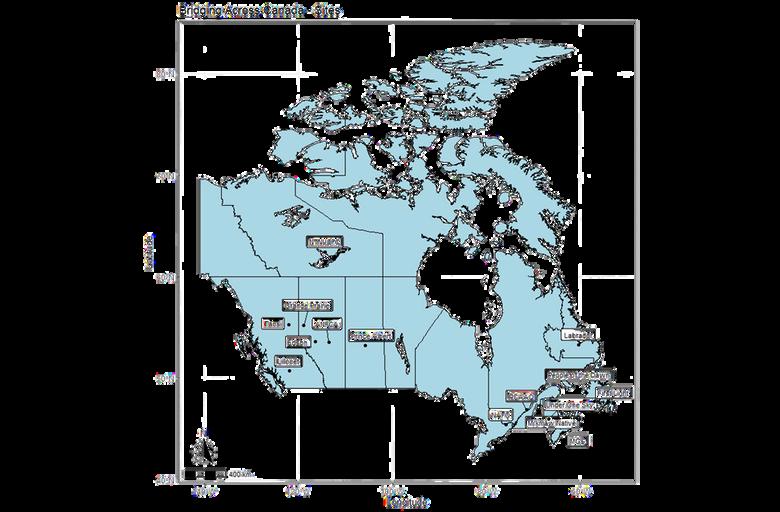
The Youth Department has been very active this year, participating in numerous events, activities, and training opportunities. They also welcomed new members to both the department and the Indigenous Youth Council (IYC).
In April, the Youth Department welcomed its newest member to the team, Aurora Ominika-Enosse, who brings a Bachelor of Social Work with a minor in Indigenous Studies, a positive energy, and a strong sense of advocacy for youth empowerment and engagement, making her an integral member of the youth team and the NAFC!
Advancing Success: An Employer's Forum on Urban Indigenous Youth and the Labour Market
In February 2023, the Employer’s Forum engaged directly with employers, providing knowledge sharing and best practices on advancing meaningful youth employment for urban Indigenous youth
The Forum also provided opportunities for attendees to explore and learn from urban Indigenous youth perspectives, connect, and network with Indigenous jobseekers, communities, and organizations, and engage in peer-to-peer knowledge sharing.
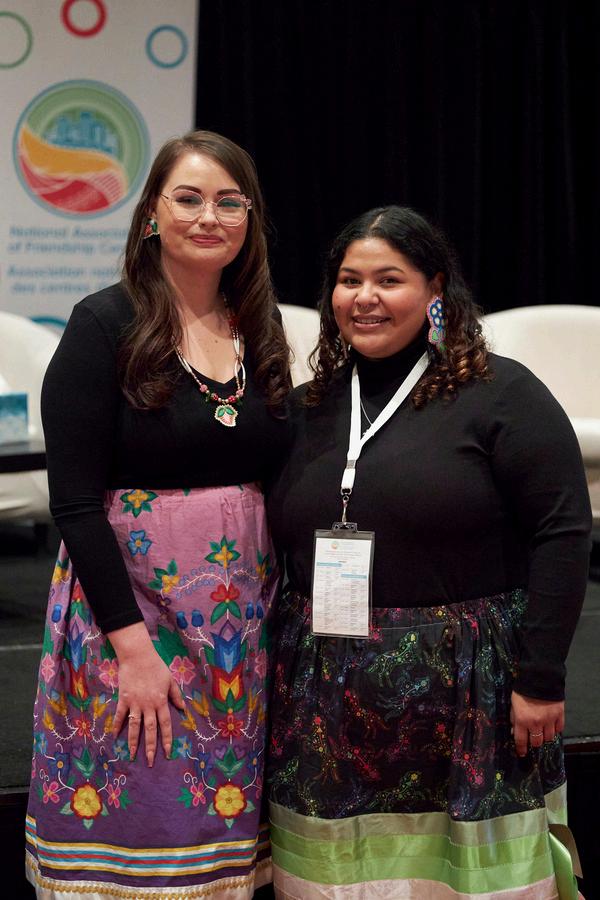
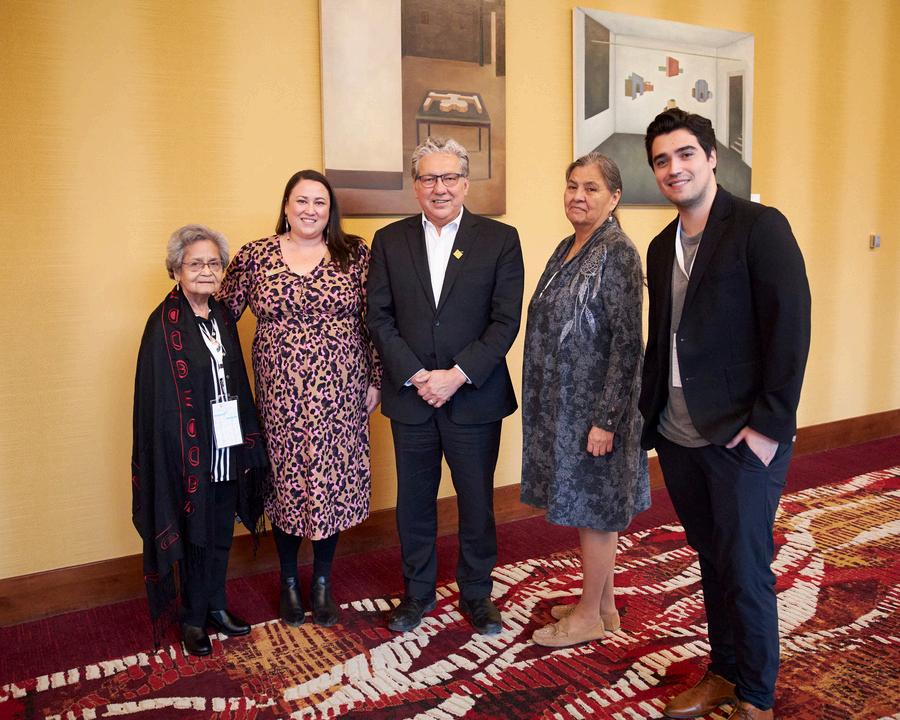
In February 2023, the Employer’s Forum engaged directly with employers, providing knowledge sharing and best practices on advancing meaningful youth employment for urban Indigenous youth
The Forum also provided opportunities for attendees to explore and learn from urban Indigenous youth perspectives, connect, and network with Indigenous jobseekers, communities, and organizations, and engage in peer-to-peer knowledge sharing.
Urban Indigenous Leadership: Train the Trainer & Leadership Training
In May 2023, facilitators from the Train the Trainer event, which took place at the Tim Horton’s Camp in Quyon, QC in April, delivered the leadership curriculum to their peers at the NAFC’s Indigenous Youth Leadership Training.
The two events gave attendees the opportunity to build confidence and skills, work as a team, and make new friends. It also provided a space for knowledge sharing about the upcoming Youth Forum and vacant positions on the IYC executive committee
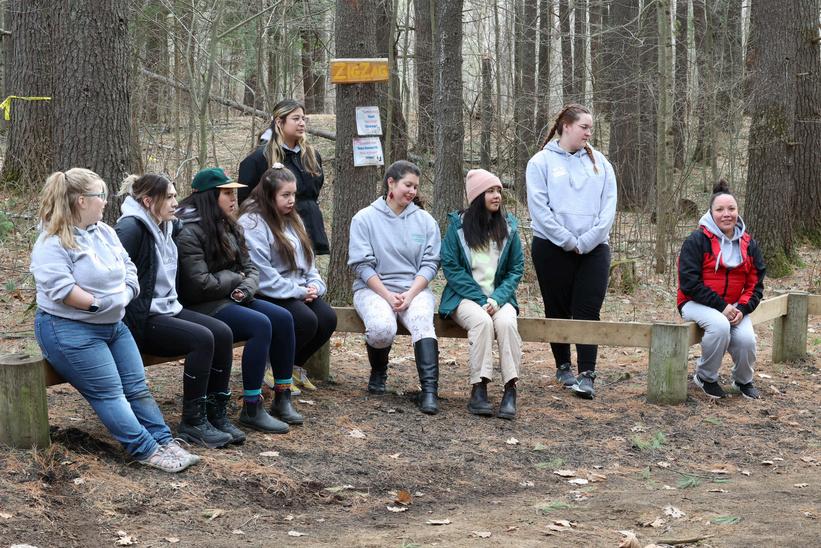
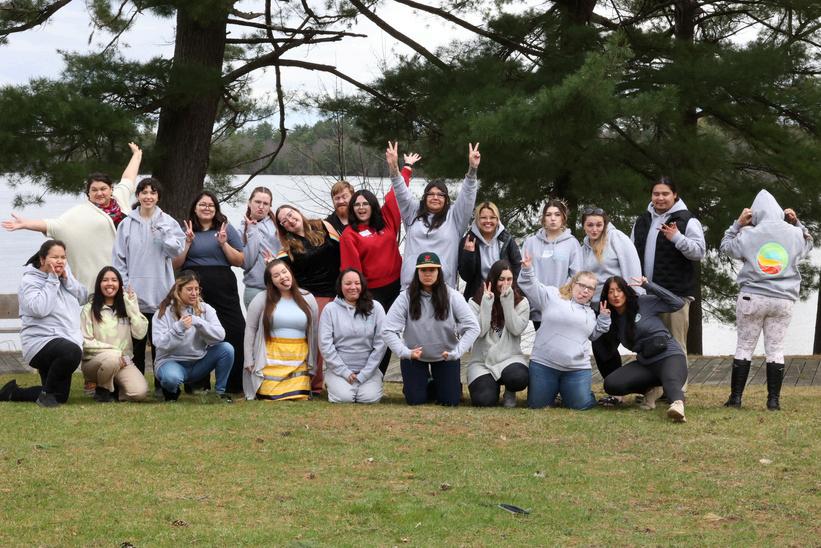
In May 2023, the Indigenous Youth Council (IYC) met at the River Cree Resort in Enoch, Alberta This was the 33rd annual Youth Forum venue The IYC toured the event space, discussed roles, and met its newest members Meetings were held where the council collaborated on workplan updates, strategic planning, and teambuilding exercises In September, members of the IYC gathered for their first orientation at the National Office in Ottawa, ON They had the opportunity to meet their new council members, learn more about their roles and responsibilities, and participate in team building activities. During this gathering, they began planning for the 2024 Youth Forum.
In 2023, the NAFC IYC welcomed:
Melanie Nasson – Atlantic Representative
Samantha Jack – Youth Executive
Taigan Alfred – Secretary
Eli Stewart – Treasurer
Derykah Friesen – Saskatchewan Representative
Ashton Francoeur – Manitoba Representative
Savannah Snow – Interim Alberta Representative
We said a full-hearted farewell to the following IYC members:
Aedon Janes – Youth Executive
Sarah Shuttleworth – Secretary
Taryn Dachuk – Alberta Representative
Gena Rae Morrison – Saskatchewan Representative
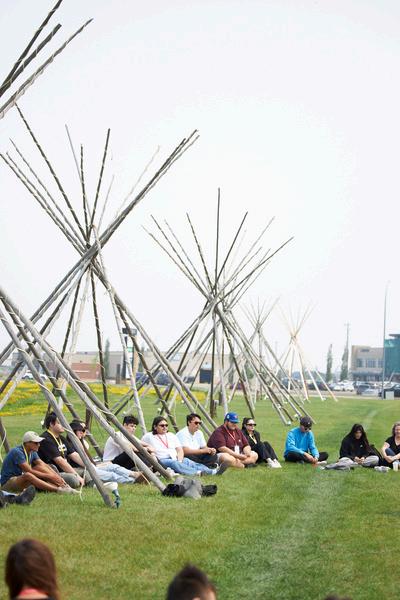
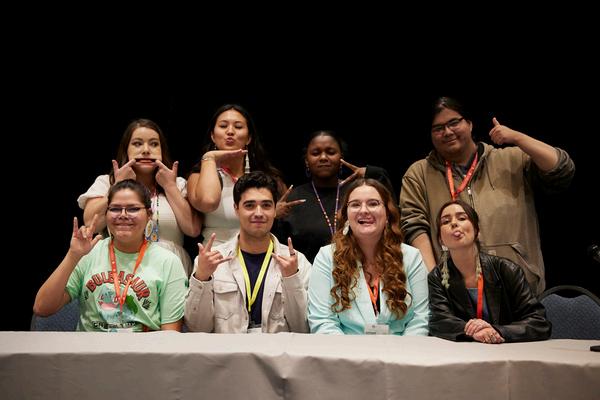
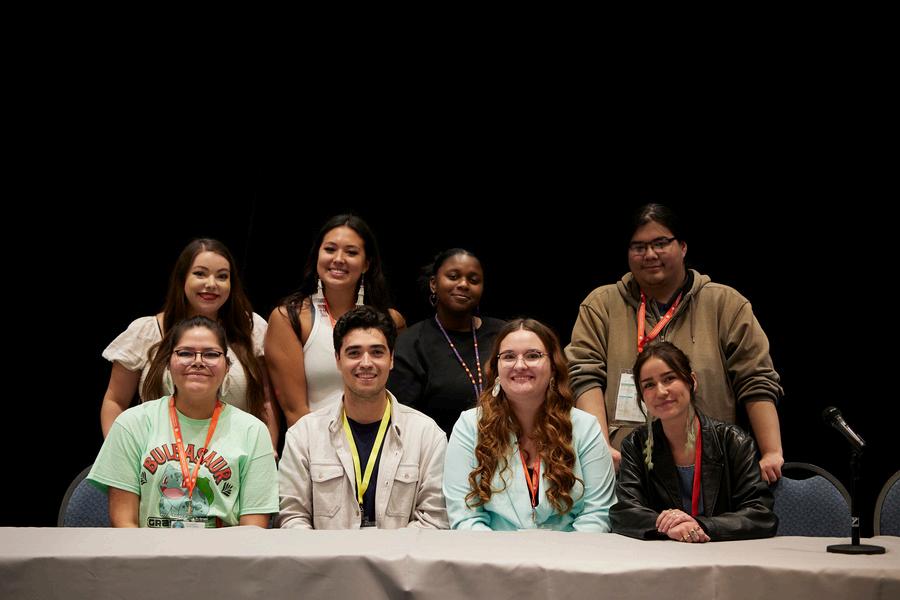
The 33rd Annual Nation Youth Forum was themed “Sowing Seeds: Rooted and Growing our Futures Together,” and took place on on Treaty 6 Territory, and the Métis Nation of Alberta Region 4 in Enoch, Alberta
Attendees had the opportunity to listen to keyynote speakers Michael Redhead-Champagne and Scott Wabano They also participated in cultural craft activities; a powerful business panel; a photo scavenger hunt at the West Edmonton Mall; the Edmonton Elks football game; an entertainment and dance night with DJ Kookum and Tia Wood; hair, make-up, and professional headshots; and a lively election for positions on the Indigenous Youth Council Executive Committee.
The event brought together around 200 participants and Indigenous youth from across the Friendship Centre Movement had the opportunity to discuss topics including youth wellbeing and connection; advocacy; self-expression; and honouring culture to guide our futures.
nafc.ca
The NAFC Youth Department facilitated a day-long workshop at the Youth Coordinator Training Workshop hosted by the Manitoba Association of Friendship Centers. The event brought Youth Coordinators from across Manitoba together to learn and discuss strategic planning, including how to strengthen their regional network.
Best practices and strategies for effective youth engagement were discussed, as well as idea sharing on how to start youth councils within their respective Friendship Centres.
Workshops and events like these allow the NAFC staff members to build stronger connections with the FCs and PTAs, while also disseminating resources with the movement
The NAFC and the Indigenous Youth Council (IYC) co-developed an approach to advance gender equality. This was initiated in 2019 from the Status of Women Canada (SWC) dialogue that took place in 2018 with urban Indigenous youth from across the country. A proposal was submitted and accepted by Women Advancing Gender Equality (WAGE). The proposed project included a focus on meaningful dialogue, providing skills and knowledge development to support the Friendship Centre Movement in taking action to advance gender equality at the local, provincial, and national levels
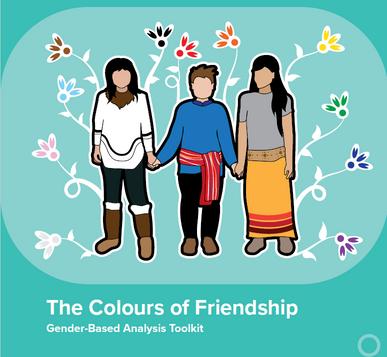
From this, the Gender-Based Analysis Toolkit took form and we are in the process of publishing The Colours of Friendship: Honouring Spaces for 2SLGBTQIA+ and IndigiQueer Inclusivity A curriculum will be created with this document to mobilize the knowledge
IYC members attended the 2nd Annual Urban Indigenous Summit in Ottawa, ON from November 27-29, 2023, where they participated in panels, moderated workshops, and built connections across the FCM. Additional opportunities included meeting with Members of Parliament and government representatives to share their voice and advocate for urban Indigenous youth on a national level.
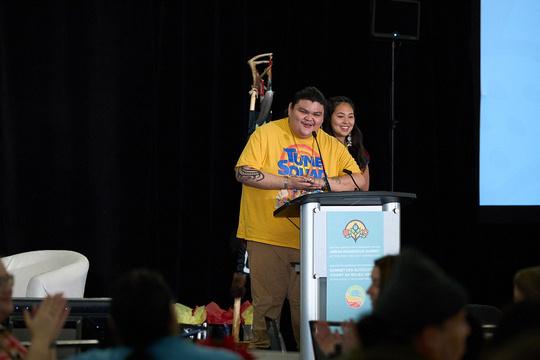
Members of the IYC attended the 2023 Gathering Our Voices event, which took place from March 22 to 25, 2023 on the traditional territories of the xʷməθkʷəyəm (Musqueam), Skwxwú7mesh (Squamish), and səlilwətaɬ (Tsleil-Waututh) Nations in the City of Vancouver. Here, the IYC co-facilitated the Urban Indigenous Youth Leadership Workshop. This was a wonderful opportunity for youth council members to practice their leadership, teamwork, and presentation skills.
In April 2023, Averi Doxtator, the IYC President attended the United Nations Permanent Forum on Indigenous Issues in New York Averi was invited to speak on behalf of the Global Indigenous Youth Caucus to address the action items on the agenda and advocated for youth funding and initiatives
Following their orientation, IYC members attended Healing Our Spirit Worldwide – The Ninth Gathering in Vancouver, BC, from September 11-15, 2023, which brought together thousands of global Indigenous leaders and health care professionals to celebrate Indigenous knowledge and cultures This event inspired IYC members to learn more about global Indigenous cultures and traditions
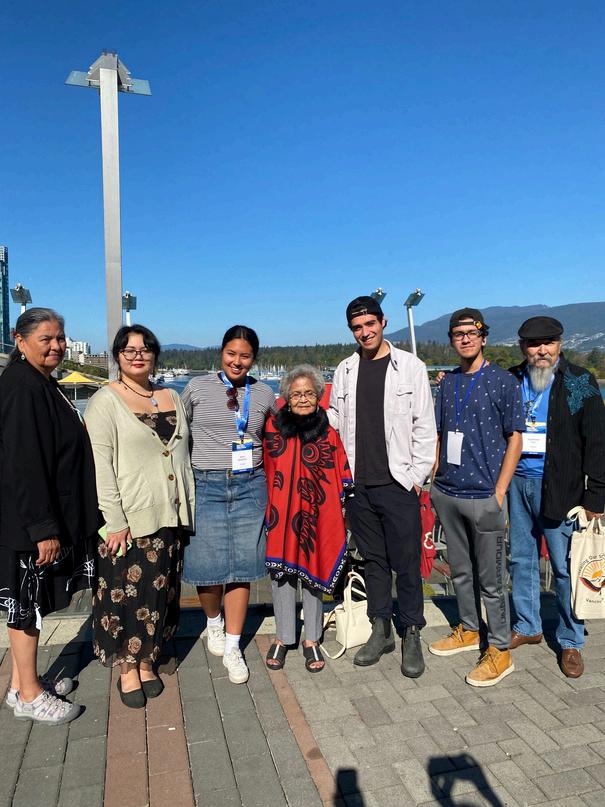
The NAFC Programs Department created the Decent Work for Urban Indigenous Youth program to empower urban Indigenous youth across the country to succeed in employment by strengthening their diverse leadership skills and growing their networks. To achieve this, the project focused on leadership training, networking and community building, and youth-led research and knowledge-sharing. In the past year, through this project, the NAFC has:
Completed a literature review and environmental scan of promising practices in Indigenous youth leadership programs, national and global labour market outcomes and data, and barriers affecting Indigenous youth employment, including an analysis of federal policies affecting urban Indigenous youth employment.
Published three youth-led community-driven research projects conducted by Feathers of Hope, Assembly of Seven Generations, and 4Rs Youth Movement to identify common experiences, intersecting barriers, and corresponding solutions related to urban Indigenous youth employment
Developed an urban Indigenous youth leadership curriculum to build and strengthen leadership knowledge and skills that are transferrable to both their personal and professional life
Planned, delivered, and facilitated two leadership training camps for urban Indigenous youth based on the developed curriculum at Camp Des Voyageurs Tim Hortons in Quyon, Quebec, with the support of the Tim Horton’s Foundation Camps:
The Train-the-Trainer and Urban Indigenous Youth Leadership Training programs provided skills development, community building, networking, cultural connections, and capacity building for curriculum delivery.
Planned and hosted a national forum titled, “Advancing Success: An Employer’s Forum on Urban Indigenous Youth and the Labour Market” to gather employers, youth, government, practitioners, and community leaders to leverage knowledge, collaboration, and resources for advancing meaningful action for urban Indigenous youth employment and leadership.
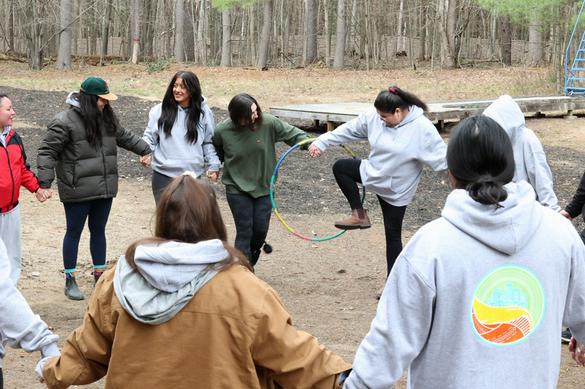
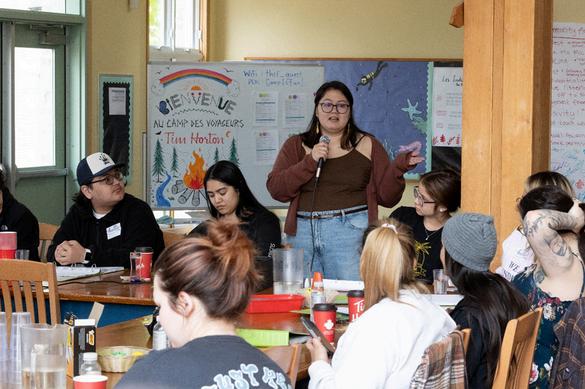
The Communications Team has updated the NAFC Communications Strategy in line with the mission and values set out in the NAFC Strategic Plan 2020-2030. The main goals of the strategy are as follows:
1. Provide accurate, transparent, clear, and accessible information on a timely basis
2. Use our communication platforms effectively
3 Inform public policy regarding urban Indigenous realities and perspectives
4 Increase two-way communication between the NAFC and our priority audiences
5 Foster positive and meaningful relationships amongst NAFC staff
6 Increase the visibility of the NAFC
7 Ensure that we are sharing culturally-specific content for all three Indigenous groups – First Nations, Métis and Inuit
8 Ensure that we are inclusive to our French audiences
The Communications Team releases quarterly newsletters providing updates about the work of the NAFC, including the addition of new sections with photo/video submissions, and a Spirits of Friendship section. You can view past newsletters and sign up to receive future ones at nafc.ca/newsletter.
The NAFC, with funding from the Public Health Agency of Canada have lead campaigns about COVID-19 and C since 2021 In 2023, We wrapped in Action COVID-19 Vaccine camp to provide up to date, medica culturally relevant information abo COVID-19 vaccines to Ur populations This campaign in Well Living House and Argyle P PSAs that were released on televi and online, influencer testimonials important to get vaccinated, hard packages, and animated PSAs fe character.

In late 2023, we began working on our Auntie Cares vaccine campaign which was a continuation of the Take Action in COVID campaign, focusing primarily on our animated Auntie PSAs to continue people to take precautions to prevent contraction of COVID-19 and to encourage vaccinations of not only COVID-19 vaccinations but other respiratory illness vaccines like the flu and RSV. The NAFC Communications Team began its 3rd consecutive Auntie Cares! vaccine campaign Planning began in August 2023, with the project well underway by September 2023
Our primary social media channels have steadily increased in followers since the new Communications Team was formed
In order to increase the visibility and profile of the NAFC, our Communications Team has spent time coming up with new and creative ways to share content on our social media platforms – specifically on our Facebook, Twitter and Instagram accounts.
In 2023, the NAFC partnered with Elections Canada to help reduce barriers to democratic participation faced by electors, including providing information on accessible services and tools, registering and voting, working, and running in a federal election. Elections Canada attended our Annual Meeting, Youth Forum, and Urban Indigenous Summit to help provide information to the Friendship Centre Movement
The NAFC partnered with the YMCA in early 2023 to promote the YMCA's Mind Medicine Training Program which aimed to provide culturally relevant mental health training to Friendship Centres and funding to run a Mind Medicine program (curriculum developed by the YMCA) at Friendship Centres This included sharing information at our Annual Meeting, Youth Forum, and Urban Indigenous Summit as well as sharing information in emails and our newsletters.
The Communications Team continued to support the needs of the NAFC team to effectively share information to the Friendship Centre Movement, the public, and our partners This included providing support for:
French Translation
Website Updates
Social Media
Emails to Friendship Centre Movement
Content Creation for Annual Meeting, Youth Forum, Urban Indigenous Summit, and additional NAFC events (including webinars and training sessions)
JocelynW.Formsma ChiefExecutiveOfficer
VeronicaWemigwans ExecutiveCoordinator
MelMaracle OfficeManager
CailinGerrard Administrative Coordinator
SunindaSharma HRCoordinator
AndrewMacumber SeniorInformation Analyst
NathanielCummings DataAnalyst
JenniferRankin SeniorDirector
ShadyHafez ProgramManager Vacant Policy&Research Manager Operations Policy&Research Programs Vacant FinanceManager
GregMurray FinanceCoordinator
RoseIneme Sr Accountant(Contract)
JohnPaillé SeniorCommunications Coordinator
JessicaHorobetz Communications Coordinator
MeganMcGrath Communications Coordinator
EugehneAdangwa FrenchTranslator
YashiKoopla PolicyAnalyst
VictoriaMarchand PolicyAnalyst
KaraLouttit PolicyAnalyst
DeborahOladele PolicyAnalyst
GaelleMushyirahamwe ResearchCoordinator
SavannahLaBelle SeniorProgram Coordinator
NatalieCahill ProgramCoordinator
JennaChisholm ProgramCoordinator
RufusJacobs YouthInitiatives Manager Youth
Aurora Ominika-Enosse ProjectCoordinator
OmovighoAbiri ProgramCoordinator
NohaHelmy ProgramAdministrative Coordinator
JustinSackaney ResearchCoordinator
Executive Committee
Kelly Benning - President
Pam Glode-Desrochers - Vice President
Laurie Bouvier - Treasurer
Édith Cloutier - Secretary
Samantha Jack - Youth Executive
Board of Directors
Tanya Andre - Yukon
Cyndi Stevens - British Columbia
Joanna Ahenakew - Northwest Territories/Nunavut
Bob Oshanyk - Alberta
Myra Malboeuf - Saskatchewan
Jack Park - Manitoba
Vacant - Ontario
Jennifer Brazeau - Quebec
Patsy McKinney - New Brunswick
Cheyenne Labrador - Nova Scotia
Stacey Howse - Newfoundland and Labrador
IYC Executive Committee
Averi Doxtator - President
Shelby Provost - Vice President
Eli Stewart - Treasurer
Taigan Alfred - Secretary
Samantha Jack - Youth Executive
IYC Regional Representatives
Zackery McNab - Northern
Madeline Burns - British Columbia
Savannah Snow - Alberta (Interim)
Derykah Friesen - Saskatchewan
Ashton Francoeur - Manitoba
Anyssa Ford - Ontario
Melanie Nasson - Atlantic
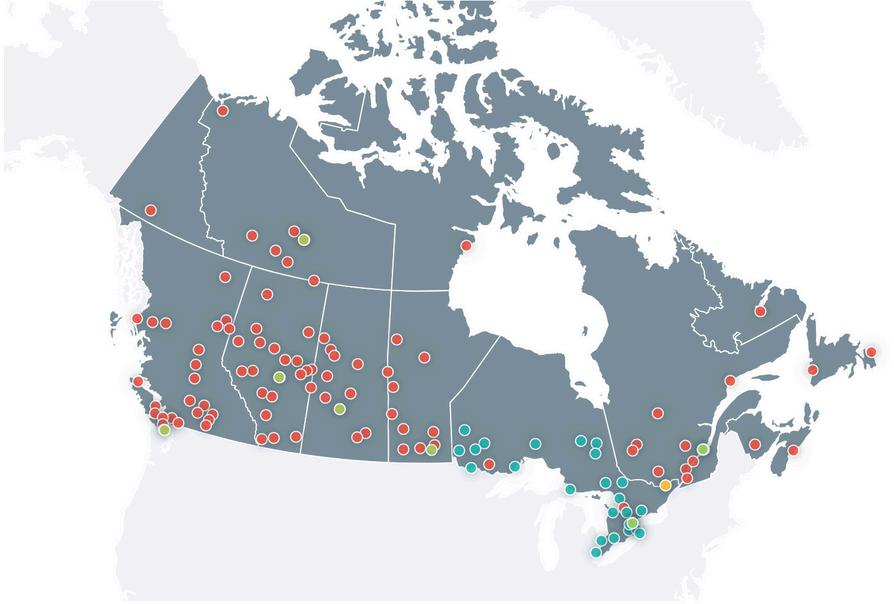
The National Association of Friendship Centres (NAFC) represents over 100 Friendship Centres and Provincial/Territorial Associations (PTA) from coast-to-coast-to-coast that make up the Friendship Centre Movement.
As of 2021, there are 125 active Friendship Centres (FCs) and 7 Provincial/Territorial Associations (PTAs). Of this number, 95 Friendship Centres and 6 PTAs are NAFC Members
The interactive tool on the NAFC’s website can be used to find local Friendship Centres and can be accessed at the following link : nafc ca/findafriendshipcentre
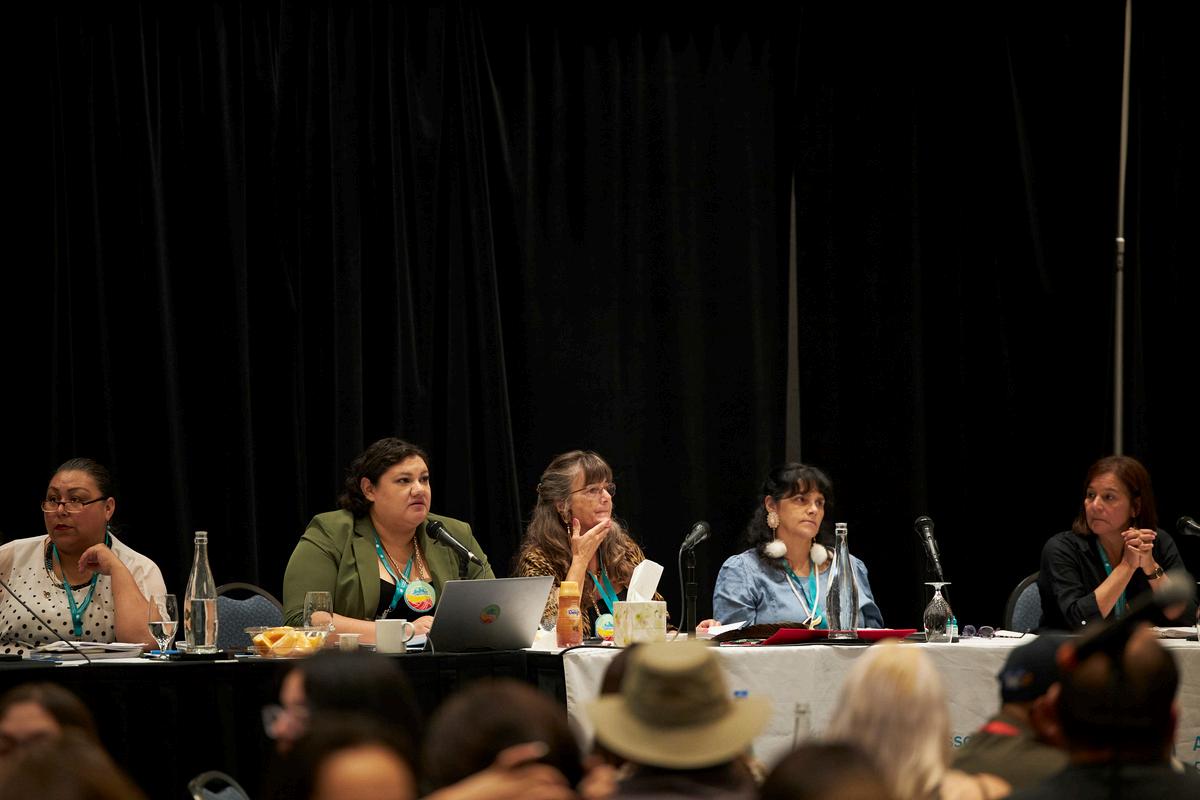
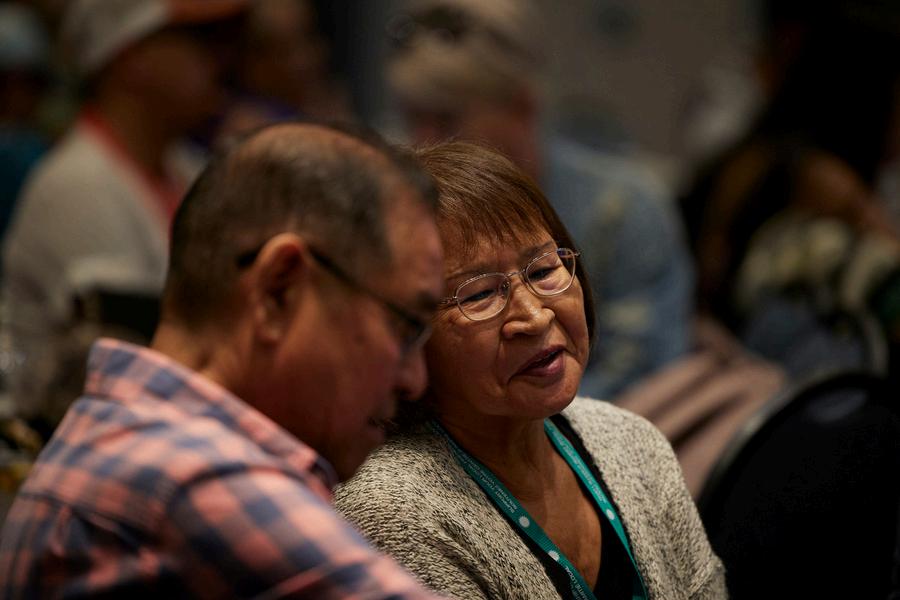
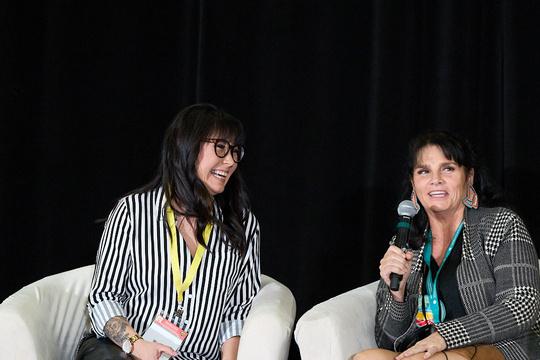
Please note that this report covers the National Association of Friendship Centre’s activities from January 1, 2023 to December 31, 2023. As our programs and portfolios are ever-evolving, more recent information may be available If you are interested in learning more about a specific project, please send an email to nafcgen@nafc ca to be connected with the appropriate department.
275 MACLAREN STREET, OTTAWA, ONTARIO, K2P 0L9
WWW NAFC CA
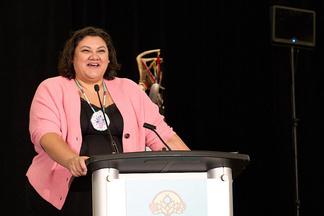
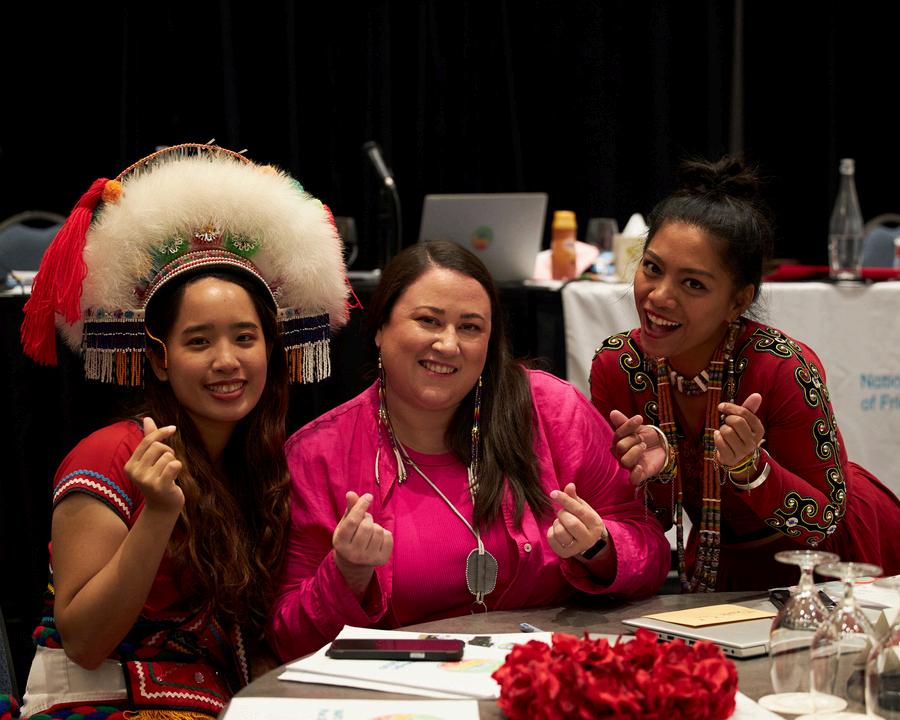
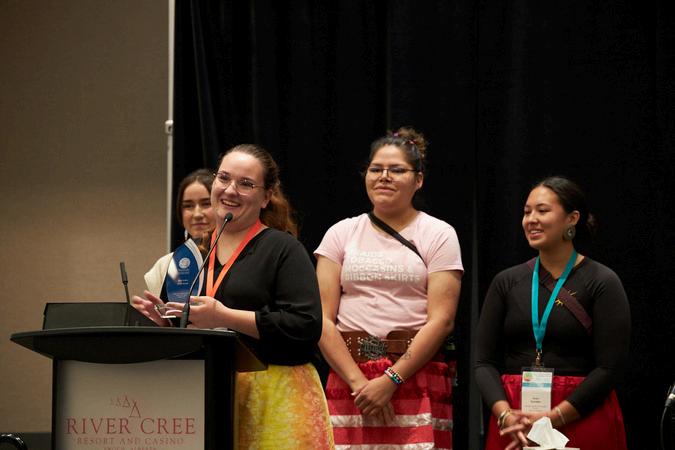

The NAFC acknowledges with respect, the Algonquin Peoples on whose traditional and unceded territory the NAFC head office is located and who allow us to work, learn and live on their lands.